“Turnabout Intruder”
Written by Gene Roddenberry and Arthur Singer
Directed by Herb Wallerstein
Season 3, Episode 24
Production episode 60043-79
Original air date: June 3, 1969
Stardate: 5928.5
Captain’s log. The Enterprise responds to a distress call from a scientific expedition on Camus II. Two of the survivors are the expedition’s surgeon Dr. Arthur Coleman, and the leader Dr. Janice Lester, who is an old flame of Kirk’s. They had an ugly breakup, apparently.
Coleman says she’s suffering from radiation sickness. Spock picks up life readings, so he, McCoy, and Coleman go to check it out while Kirk stays with Lester. They discuss their old times, then Kirk checks out the room she’s in. As soon as he gets near a wall, Lester—suddenly not looking at all ill—hits a control that attaches Kirk to the wall. She leans against another part of the wall, and she and Kirk switch bodies: Lester’s personality and mind is now in Kirk’s body, and vice versa. Kirk is overcome and ill from the transfer, but Lester is just fine, and rants and raves about how he should have killed her, but he was too weak—but she isn’t, and she’s about to strangle him when the others come back. The people they wanted to rescue didn’t make it.
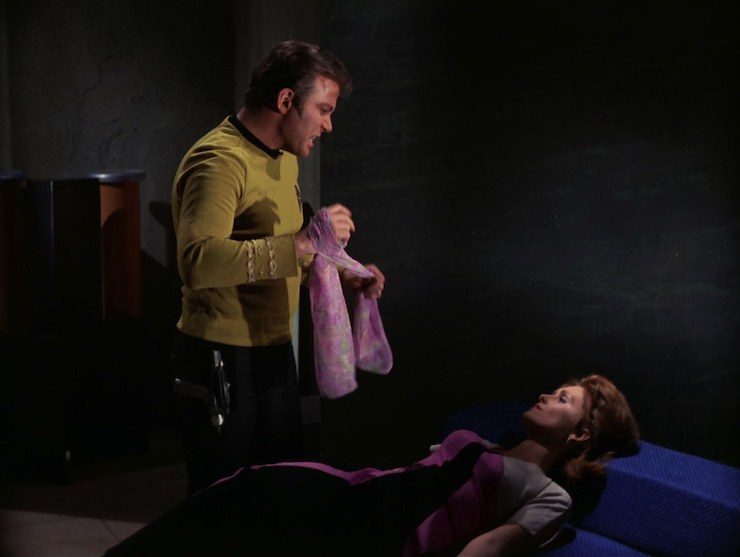
McCoy wants to beam “Lester” back to the Enterprise, and “Kirk” agrees. Coleman and McCoy disagree on what type of radiation poisoning “Lester” is suffering from. Lester then gives McCoy a biased account of the Kirk-Lester relationship, and McCoy promises to do all he can.
Lester arrives at sickbay, where it’s clear that Coleman and Lester conspired to kill the rest of the expedition and set up this transfer. “Kirk” then orders Coleman to be responsible for “Lester’s” treatment, against McCoy’s better judgment. Coleman then orders the patient sedated, also against McCoy’s better judgment, but he tells Chapel to go ahead and administer the sedative.
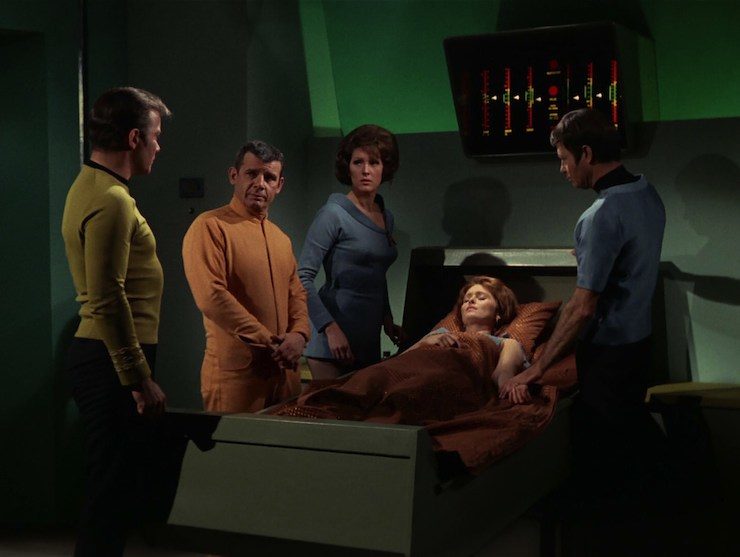
Lester heads to the bridge, giddy with the fact that she can now command a starship. She’s studied everything available on starship operations. She goes to the bridge and orders a course change to Benecia, where “Lester” can be treated—but it involves going out of their way, and they’ll be late for their rendezvous with the Potemkin at Beta Aurigae. Spock points out that Starbase 2 has a much better medical facility and is actually on the way—but Benecia is only 48 hours away, where the starbase is 72 hours away, and Lester says that “Lester” doesn’t have that kind of time. Throughout the discussion on the matter—including the communications officer Lieutenant Lisa asking if Starfleet Command should be notified of the delay—Lester is inappropriately jocular and snappish and irritable. When Spock suggests that increasing speed would allow them to make their rendezvous without a problem, Lester pouts and orders an increase to warp 6 before leaving the bridge in a huff.
McCoy meets with “Kirk” in the captain’s quarters—where Lester is filing her nails, in case we’ve forgotten that Kirk is a girl now—to bitch about being taken off “Lester’s” case. His problem isn’t being removed as such, it’s with Coleman, who was removed from his post as a starship chief medical officer for incompetence. Lester brushes it off as politically motivated, but McCoy insists that that sort of thing doesn’t go on in the Surgeon General’s office of Starfleet Command. He also insists that “Kirk” report for a full physical because his emotional behavior has been erratic since returning from Camus II.
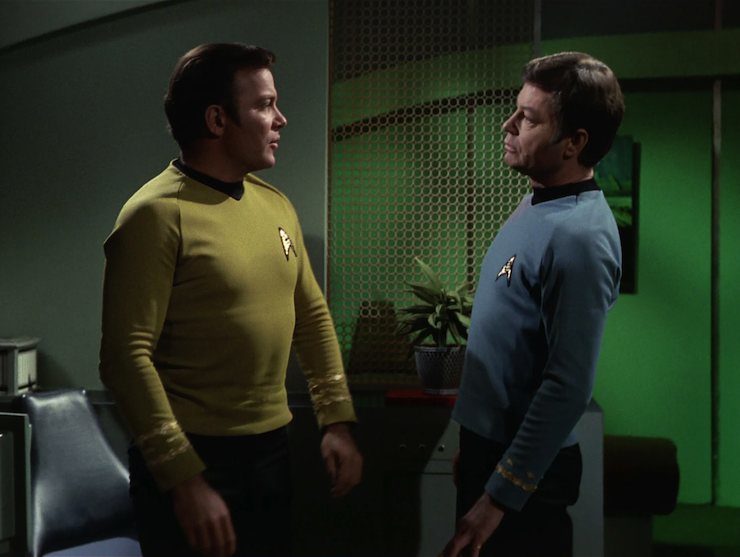
Kirk wakes up in sickbay and is very confused. Coleman calls him “Dr. Lester” and insists that he’s delusional and insane, that the paranoia’s been developing for months and the radiation’s making it worse. Coleman orders Chapel—who is convinced that “Lester” is insane because of his insistence at not being Janice Lester—to prepare a sedative.
Later, Kirk tries to get Chapel to let McCoy see him, but that’s against Coleman’s orders—however, she does think she can arrange for Spock to see “her.” Chapel leaves Kirk with a glass of liquid, and once Chapel leaves, he breaks the glass and cuts through the restraints.
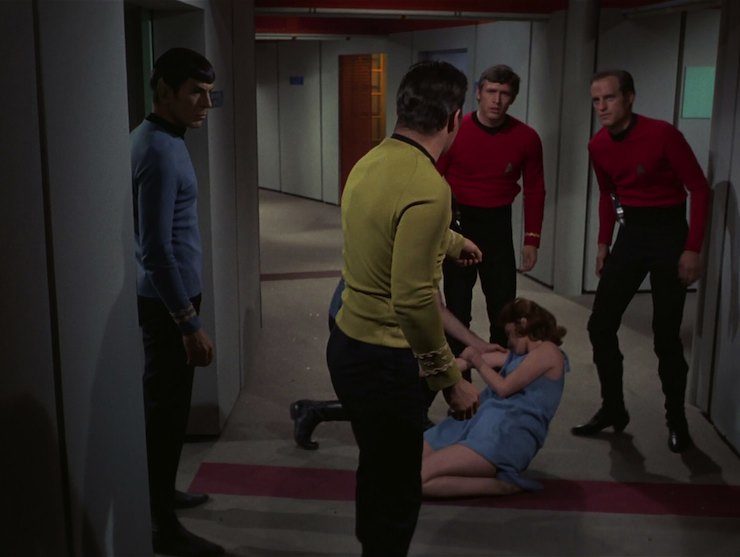
Spock and McCoy are discussing “Kirk’s” mental illness and the tenseness of the crew with regard to the captain’s being so erratic. Lester arrives for “Kirk’s” physical and a minute later, Kirk arrives needing to talk to Spock and McCoy (and still carrying the broken glass). Lester subdues Kirk physically, and orders security to confine “her” to quarters.
McCoy conducts the physical of “Kirk” while Spock questions “Lester.” Kirk describes the body transfer, which Spock says has never been successfully accomplished, Spock having apparently totally forgotten the events of “Return to Tomorrow.” Kirk reminds Spock of the events of “The Tholian Web” and “The Empath,” but Spock points out that she could have just read the Wikipedia entries for those episodes. So Kirk suggests a mind-meld, and that does the trick. Unfortunately, the mind-meld isn’t really evidence.
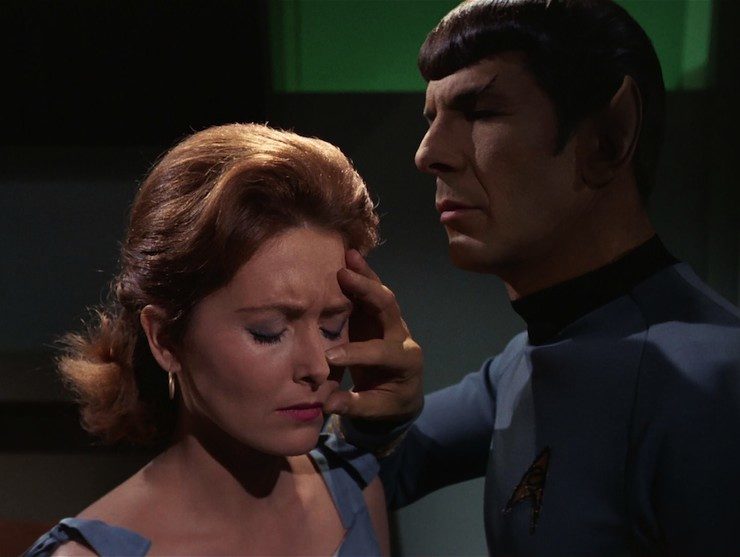
However, when Spock tries to leave with “Lester,” the security guards try to stop him. They also alert “Kirk” to the attempted breakout, right after McCoy gives “him” a clean bill of health.
Lester puts Spock under arrest and a tribunal consisting of “Kirk,” McCoy, and Scotty is convened to determine the charges against Spock. At Spock’s insistence, “Lester” is brought to testify. Lester questions Kirk, taunting him and tormenting him and making him seem as insane as possible. She also accuses Spock of conspiring with “Lester” to get command of the Enterprise for himself. Spock says he’ll do everything in his power to stop “him” from taking over.
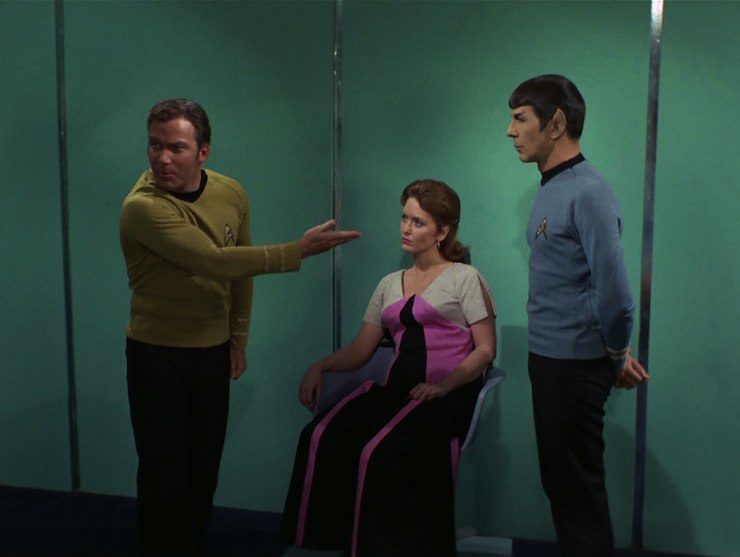
The bad news from Spock’s perspective is that he has stated for the record that he will commit mutiny. The good news from Spock’s perspective is that Lester’s response is over-the-top and shouty even by Kirk’s high standards.
Lester declares a recess, after which they will vote on Spock’s being charged with mutiny. Scotty talks with McCoy—he believes Spock based solely on Kirk’s behavior, which is completely out of character. McCoy is less sure, because they don’t have any tangible evidence. Scotty convinces him that they should vote in Spock’s favor, and that it’ll stick in “Kirk’s” craw, and then they’ll have to move against “him.”
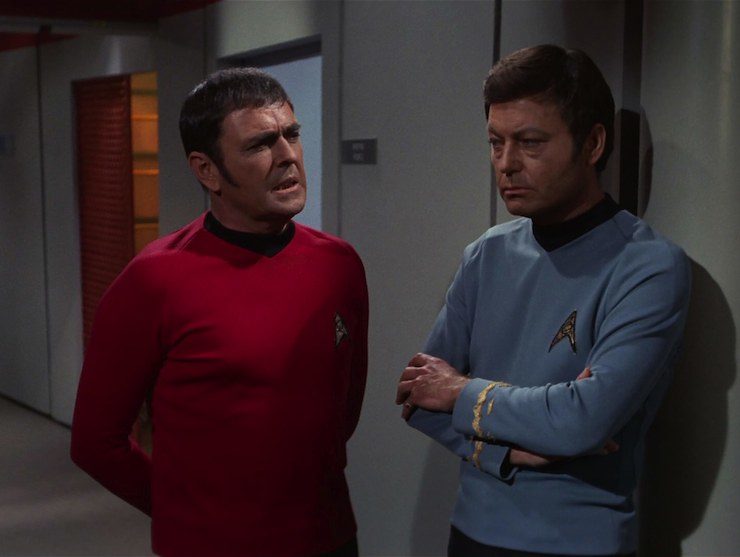
However, Lester recorded their conversation in the corridor, and accuses all three of mutiny and sentences them to death. Sulu and Chekov point out that there’s only one death penalty on record, and nobody’s gone to Talos IV, so there’s no call for it here.
Sulu and Chekov are appalled, and when Lester comes to the bridge, they both refuse to follow his orders. For a second, the transference weakens, and Kirk and Lester temporarily return to their own bodies. Outraged at the bridge crew mutinying, she runs to Coleman, who says the only way to stabilize the transfer is to kill Lester’s body. Coleman reluctantly agrees to be the one to commit the act, and he prepares a hypo.
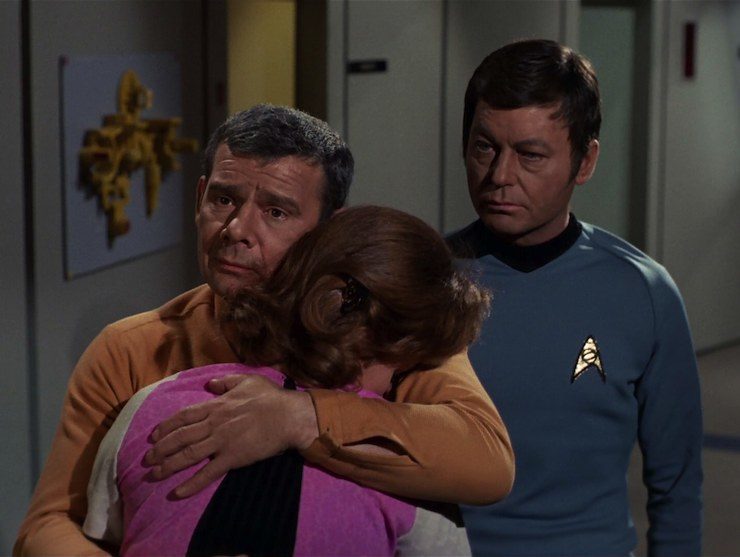
They arrive at the brig. As soon as “Lester” is released to Coleman, Kirk attacks the doctor, and then the transfer detstabilizes again. Lester and Kirk are back in their original bodies, and Lester has a complete psychotic break. Lester collapses in Coleman’s arms, and Coleman declares his love for her and asks that he be allowed to take care of her. The fact that they killed an entire expedition of scientists is conveniently forgotten when McCoy agrees to that…
Can’t we just reverse the polarity? The people of Camus II doped out the technology that would allow someone to trade bodies with someone else. The process is reversed when the plot of the episode dictates that it be so reversed, since the script doesn’t bother to provide any explanation as to why Lester and Kirk are restored when they are except for the running time of the episode reaching the 47th minute…
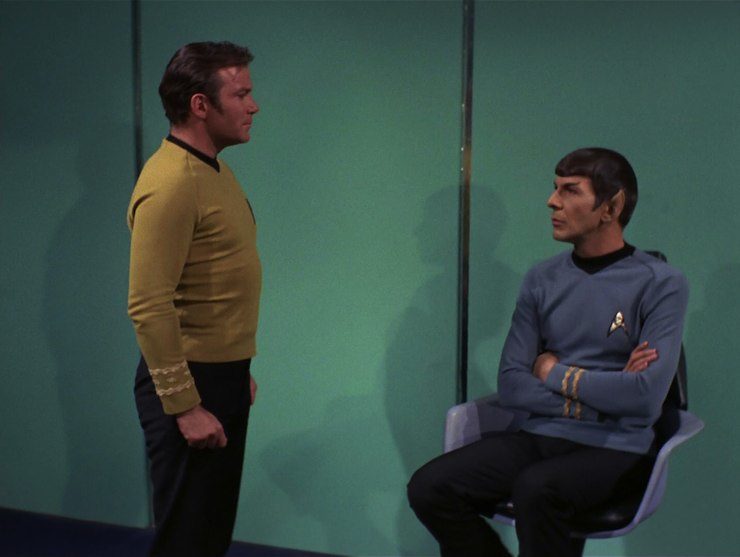
Fascinating. Spock proves once again willing to break every rule in the book in order to save his captain, and once again he’s hit with the death penalty, and once again he doesn’t actually get killed. Lucky bastard.
I’m a doctor not an escalator. McCoy is the rational one here, an amusing role reversal, as Spock is the one giving the emotional argument. But while McCoy is sure that something has happened to “Kirk,” he nonetheless is reluctant to take action without evidence to back it up, and his exam provides none such. Having said that, his verbal takedown of “Kirk” and of Coleman’s qualifications in the captain’s quarters is beautifully done.
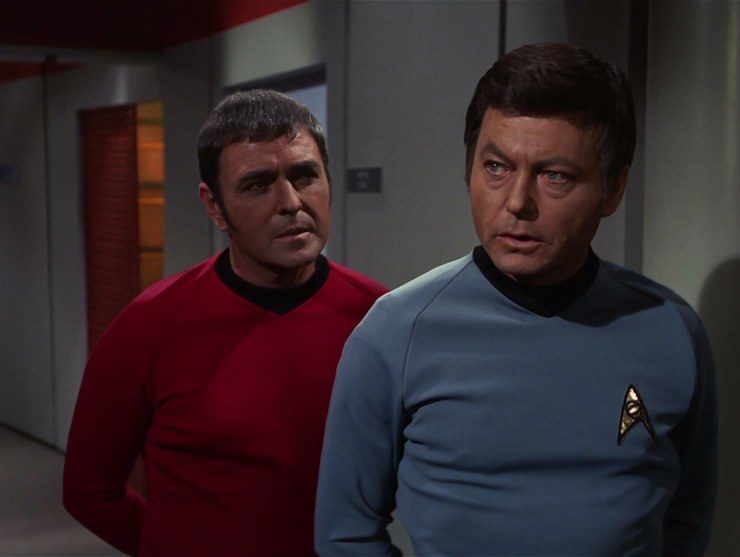
Ahead warp one, aye. Sulu has a crowning moment of awesome in this episode when he and Chekov are discussing what to do in light of “Kirk” declaring a death sentence on Spock, McCoy, and Scotty. When Chekov questions how they can fight the captain with security on his side, Sulu speaks with impressive verve and intent: “I’ll fight them every way and any way I can.”
It’s a Russian invention. This is the last appearance of the character of Pavel Chekov in a TV series—all his subsequent appearances are in films, as he’ll next be seen in Star Trek: The Motion Picture, and Walter Koenig never appeared on any of the spinoffs, not even the animated series. (Well, okay, except for the archive footage in “Trials and Tribble-ations,” but that doesn’t really count…)
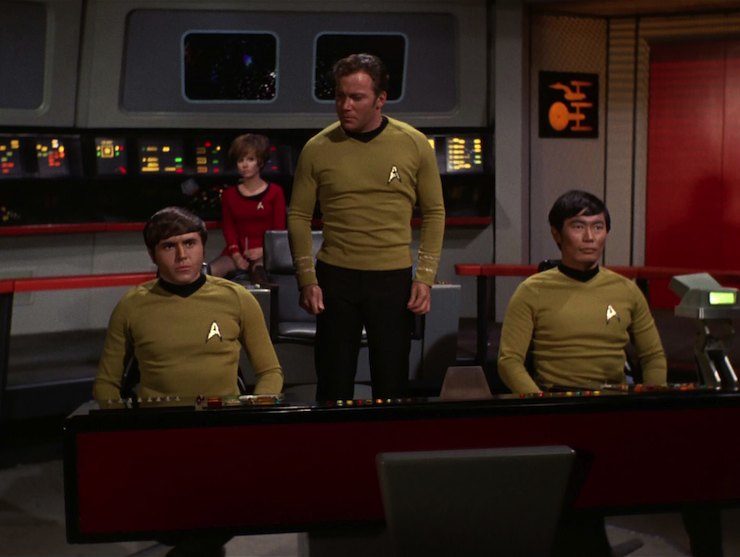
I cannot change the laws of physics! Scotty is actually on “Kirk’s” side of things right up until he sees Lester lose her shit during the hearing.
Go put on a red shirt. Security in the form of Galoway and Lemli pretty much obey the orders of the person who looks like Kirk regardless of how crazy they are. When Sulu and Chekov discuss trying to stop the execution, Chekov points out that “Kirk” has security on “his” side, which proves that he’s forgotten Enterprise security’s rather appalling track record for actually doing their job.
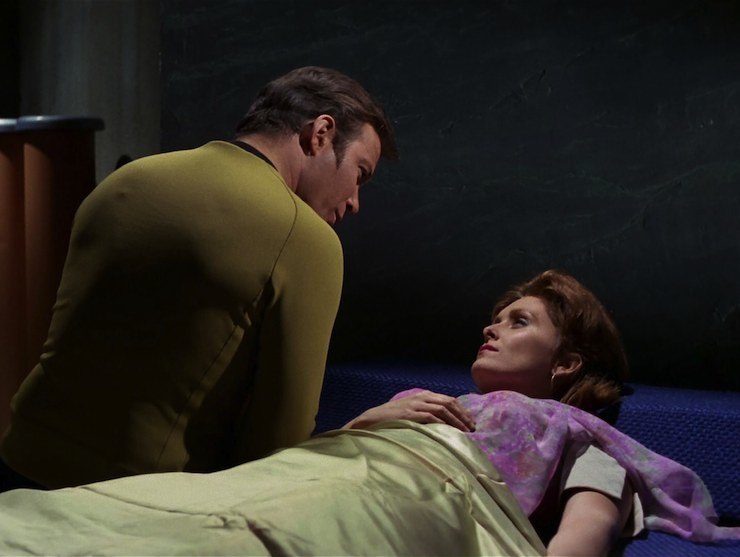
No sex, please, we’re Starfleet. Lester claims that she and Kirk broke up because “Your world of starship captains doesn’t admit women.” This has often been interpreted to mean that the Starfleet of the 23rd century didn’t allow women captains (at least not until the movie era, when we finally saw a female shipmaster in Madge Sinclair’s Saratoga captain in Star Trek IV: The Voyage Home), which probably sounded perfectly reasonable in a 1969 TV show in which the women all wore miniskirts, but which future iterations will try to either justify or ignore, but which mostly can be dismissed as the ravings of a person who was not entirely sane. (Amazingly, there was actually a segment of the fanbase that was outraged when Enterprise established Captain Erika Hernandez of the Columbia, because this episode said there were no female ship captains as of the 23rd century, which is just idiotic on every possible level.)
Channel open. “Doctor, I’ve seen the captain feverish, sick, drunk, delirious, terrified, overjoyed, boiling mad. But up to now I have never seen him red-faced with hysteria.”
Scotty perhaps revealing a bit too much about the times he and Kirk have gone on shore leave together.
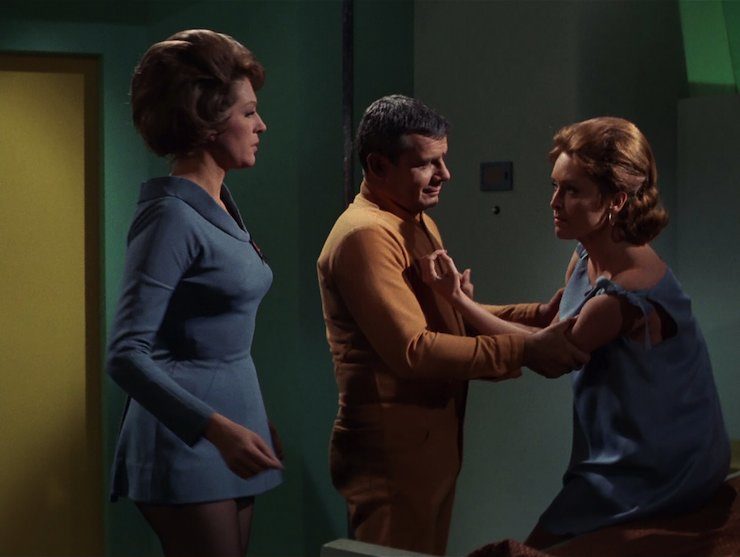
Welcome aboard. The big guests are Sandra Smith as both Lester and as Kirk in Lester’s body (and she actually does a pretty good Shatner impersonation as the latter) and Harry Landers as Coleman.
Barbara Baldavin returns as Lisa, having previously played Martine in “Balance of Terror” and “Shore Leave“—Nichelle Nichols had a singing engagement and was unavailable. David L. Ross makes another appearance as a security guard, this time as Galoway, who’s obviously a totally different character from Galloway, who was killed in “The Omega Glory” (not to mention Johnson, who was killed and resurrected numerous times in “Day of the Dove“). Roger Holloway plays Lemli, a security guard who’s been seen as a background character throughout the series, and who finally got a name and a line of dialogue in this final episode.
And we’ve got recurring regulars James Doohan, George Takei, Walter Koenig, and Majel Barrett.
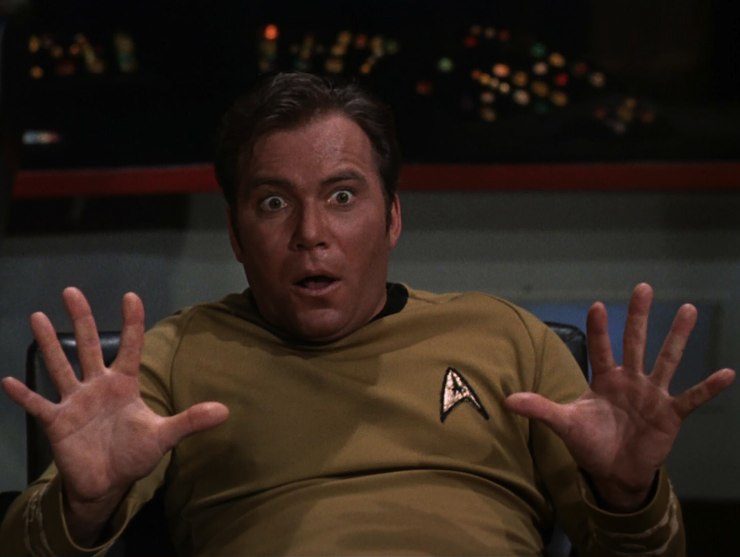
Trivial matters: This is the last episode of the live-action iteration of the original series, last produced, last aired (both in the U.S. and the UK, the latter of which had a radically different airing order for the episodes), and even the last to be remastered (well, technically “The Cage” aired last in the 2007 remastering). Kirk, Spock, McCoy, Sulu, Scotty, Uhura, and Chapel will all next appear in “Beyond the Farthest Star,” the first animated episode. Chekov next appears in The Motion Picture.
The episode was supposed to be aired on the 28th of March, the week after “All Our Yesterdays,” but it was preempted for coverage of the death of former President Dwight D. Eisenhower and not aired until June. For this reason, this is the only episode of the original series that aired in my lifetime (I was born on the 18th of April in 1969).
When TNG passed the 79-episode mark in “Legacy,” there was a reference to this episode in Picard’s log, where he said the Enterprise was called away from a mission to Camus II.
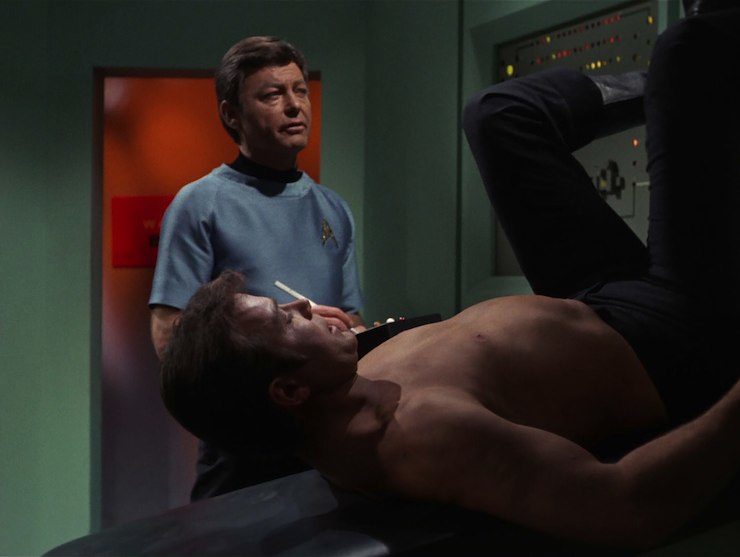
This episode has a callback to the first regular episode of the series, “The Corbomite Maneuver,” with a shirtless Kirk taking a leg-based stress test under McCoy’s supervision.
This episode was partly inspired by the 1931 novel Turnabout by Thorne Smith, in which a husband and wife switch bodies. The novel was the basis of a 1940 film and a short-lived 1979 TV series starring John Schuck and Sharon Gless.
Roger Holloway’s security guard was given the name “Lemli,” which was also the vanity license plate on William Shatner’s car, for his daughters Leslie, Melanie, and Lisbeth.
Benecia was previously mentioned in “The Conscience of the King.” Kirk mentions the events of both “The Tholian Web” and “The Empath” to try to convince Spock that he’s really Kirk, while Chekov mentions General Order 4 as the only death penalty on record, established in “The Menagerie” as the penalty for going to Talos IV. (It’s actually General Order 7, but they probably got the order number and the planet number mixed up.)
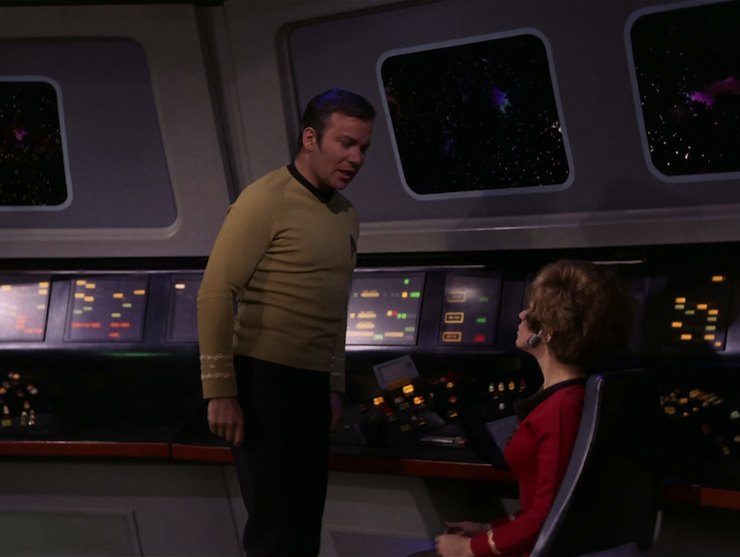
The short comic book story “Captain’s Personal Log” by David Tischman & Leonard O’Grady in Focus on… Star Trek from IDW served as a sequel to this story, and also set up the Year Four miniseries that Tischman would write for IDW. That story established that Lester was sent to Elba II, the insane asylum seen in “Whom Gods Destroy.”
The Beta Aurigae system was mentioned again in “The Leader” by Dave Galanter in Constellations, Gold Key’s Star Trek #48 by Arnold Drake, Doug Drexler, & Alden McWilliams, and your humble rewatcher’s The Brave and the Bold Book 1.
Starbase 2 is also a part of the novels Final Frontier by Diane Carey, Foundations by Dayton Ward & Kevin Dilmore, and Mindshadow by J.M. Dillard; the Starfleet Operations Manual game book from Decipher; the reference book Federation: The First 150 Years by David A. Goodman; and the short story “The Sleeping God” by Jesco von Puttkamer in The New Voyages 2.
Joan Winston got to spend time on the set during the filming of this episode, and she wrote an account of that experience in the 1975 book she wrote with Jacqueline Lichtenberg and Sondra Marshak, Star Trek Lives!
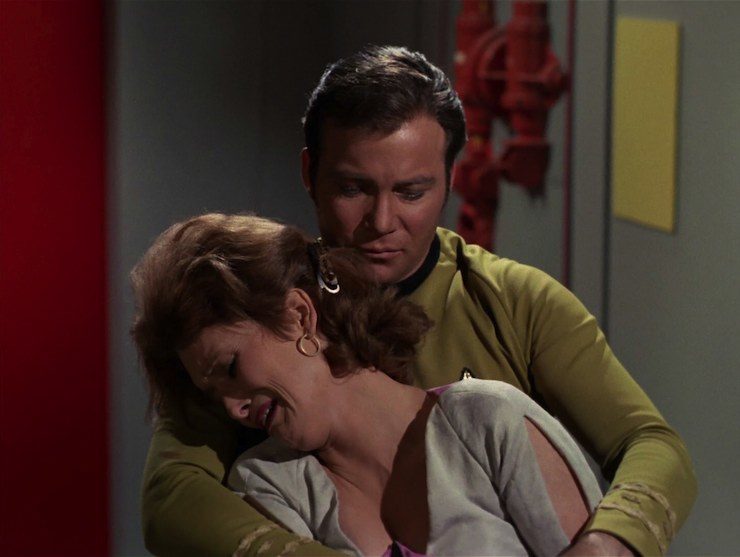
At the end of the episode, Kirk says, “Her life could have been as rich as any woman’s—if only…” and he trails off. In James Blish’s adaptation in Star Trek 5, Kirk’s line finishes, “…if only she had been able to take pride in being a woman.” In my living room, my fiancée and I finished it with, “…if only she had just kept her place,” which is depressingly closer to what the script was implying. (By the way, the back cover copy of Star Trek 5 described this episode as “the ultimate in women’s lib,” which is one of the most offensive things ever put on the back cover of a Star Trek book. Sheesh.)
To boldly go. “Are we going to allow an execution to take place?” Believe it or not, this episode is not wholly devoid of redeeming social value. (Stop laughing!) For starters, as with most body-switching episodes, it’s a great vehicle for the actors. It’s a delight to watch William Shatner swish his way through the role, changing his posture, changing his speaking patterns, and even little touches in the script like his calling the ship by saying the more formal “Captain Kirk to the Enterprise” rather than the simpler “Kirk to Enterprise” that we’re used to from the real McCoy—er, that is, real Kirk. Sandra Smith likewise does an excellent job of modulating from Lester’s raving insanity to Shatner’s speaking patterns and mannerisms (like the head tilts and the charming smile, used on Chapel).
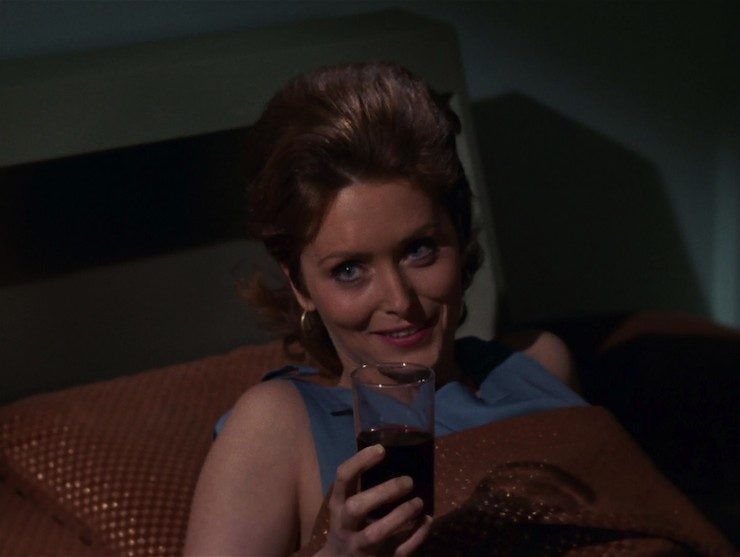
There are some really good character moments here, too. I love watching how each member of the crew comes to the realization that Kirk isn’t Kirk. With Spock, he’s completely skeptical right up until he reads “Lester’s” mind and realizes that, yeah, that’s the captain, and from that point on, he’s completely on Team Jim. McCoy is actually the first to notice that something’s wrong, but he also is insistent that there be evidence (so is Spock, but he can get his by touching his fingers to someone’s nose and cheekbones), and he hasn’t gotten any yet. Scotty doesn’t come around until he sees Lester being all binky bonkers, and he eventually manages to convince McCoy. Chekov doesn’t come around until Lester calls for the death penalty. And most interestingly, Sulu doesn’t seem to give a damn one way or the other because the only thing that matters to him is that three people have been ordered to their deaths, and there is no way he’ll let that stand, no matter who’s giving the order. And good for him.
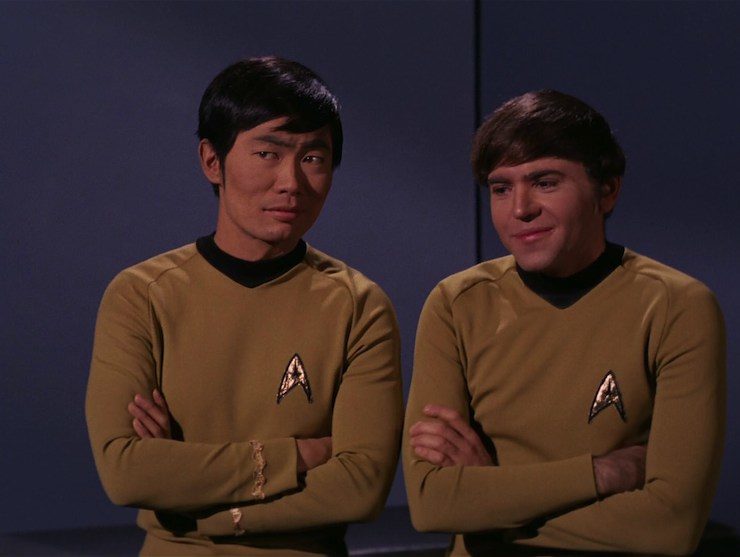
Unfortunately, in the end, this is all lipstick on a pig, because holy crap, this episode is offensive from the ground up and offensive from the roof on down the other side. The hysterical-woman trope has already reared its ugly head more than once (“The Conscience of the King,” “Wolf in the Fold“), but it’s at its most overt here. Lester hates being a woman because being a woman restricts her, at least in her mind, thus once again reinforcing the stereotypes of the day. It’s a particularly fascinating episode to talk about on the day that we could very well elect a woman president for the first time in our 240-year history—and, regardless of the outcome, it’s the first time a major presidential candidate has been female. Forty-seven years ago, it probably seemed perfectly reasonable for Gene Roddenberry, the creator of a show that was so forward-thinking in so many ways, to pen a story that had a woman go nuts rather than deal with the glass ceiling that’s just the way things are, y’know?
And the hell with that. Star Trek is at its best when it looks forward. It did to some extent and didn’t in others. The sexism was particularly galling, and is one of the aspects that makes it harder to watch five decades on, and especially frustrating to a) come from the guy who created the show and b) from a season that’s actually done much better with regard to female characters. But then, Roddenberry hasn’t been in charge of this season, so it’s not that surprising that the female characters have been stronger in general, nor that we get the worst example from him.
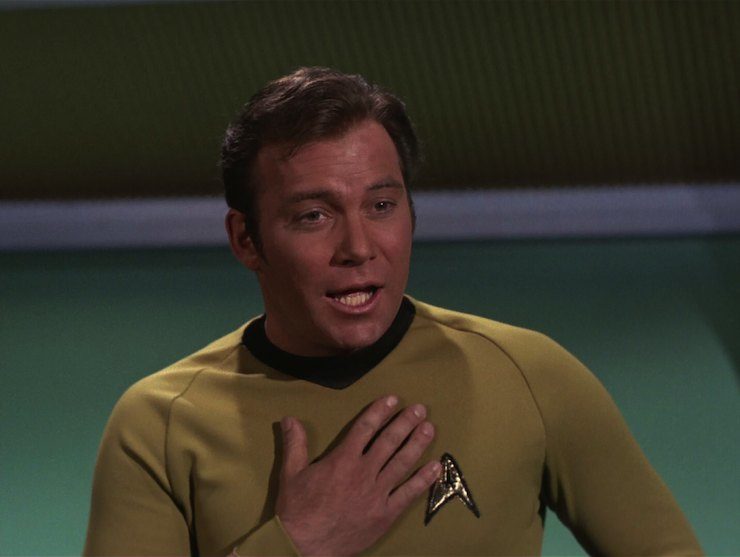
Parts of Star Trek should be lauded, and parts still are forward-thinking fifty years later (like the color-blind casting of many roles). Other parts have aged badly (and indeed, already had done so when the show was syndicated in the 1970s). This is one of the latter, and is a stupid, hoary story besides. It is both the last and the least of what Star Trek is.
Warp factor rating: 2
Next week: Season 3 roundup
Keith R.A. DeCandido is really looking forward to diving into the animated series in two weeks.










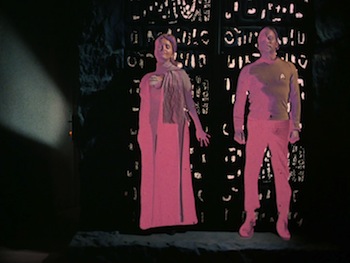
It’s a terrible episode for all the reasons mentioned: the sexism is horrific and overrides any of the nice characterizations in the script. The callbacks were nice touches given that it was the last episode (and they knew this when they filmed it, so I assume the callbacks were very intentional).
Another callback was the use of the “Doomsday Machine” Jaws-like music during the final Kirk/Lester mind switch at the end of the episode. I think this is the only time in the third season that those music cues were used.
To his credit, GR later in his life admitted that the story was very sexist and didn’t make excuses for it. Even knowing that though I still find it virtually unwatchable just because the sexism is so cringeworthy. Which is too bad because there is some good acting here, unfortunately in the service of stupid and backward idea.
I have always wondered, and I don’t recall if it was ever explained to me, why any TV series would wait THREE MONTHS before airing ONE episode.
All Our Yesterdays aired in march and this aired in June. WHY????
Yeah, I was surprised to see how many aspects of the episode I liked when I rewatched it, but ultimately it didn’t change the fundamental awfulness of the premise, which spoils the whole thing.
But it is one of Sulu’s best moments in the 50 years of Trek history, IMO…..
—Keith R.A. DeCandido
Lou, could you actually, y’know, read the rewatch entry before asking questions? I answered that question right there in the Trivial Matters section — the episode was postponed from its original air date because of news coverage of the death of Dwight Eisenhower.
—Keith R.A. DeCandido
Ike’s death explains why the episode was postponed, but not the 3 month delay. I’m assuming that NBC had other programming lined up through May sweeps and didn’t have a slot to place the final episode of a cancelled series.
Spock could have exposed Lester-as-Kirk with just five words.
Queen to queen’s level three.
Like other episodes that had GR’s strong influence, there is good characterization and good dialog. And like the other GR episodes, he tried to give something for the supporting cast to do. If you read some of the production material, he was very conscious of this. He was the driving force in the the first season making scripts that showed starship life and the crew at large.
But ultimately the episode is ruined by a dumb story idea and lots of backwards sex politics. Gene really was much better at re-writing other people’s stories than he was at coming up with his own.
I’m glad you liked some aspects of this episode, because I’m rather fond of it.
I agree about the hysterical woman trope, but apart from that, I find that the episode is not as sexist as its reputation. I find Mudd’s Women or Wolf in the Fold far worse. Actually, I think it’s nicely ambiguous.
For starters, while it’s true that Lester is a stereotypical hysterical woman, she is also Doctor Janice Lester, the leader of a scientific expedition. That’s just cool – even when they do a sexist stereotype, she’s still a serious scientist. Second, when Lester and Kirk talk in the beginning, he’s on her side – he agrees with her that “it isn’t fair”. Then, while she goes on and on about how terrible it is to be a woman, she seems to be the only one who thinks so. Kirk, after he has overcome his initial shock at finding himself in another body, seems to be totally unfazed by the fact that he’s a woman. In his log entry (btw, how does he make that log entry?) he only complains that he’s “held captive in a strange body and separated from all my crew.” And Kirk’s last line allows for very different interpretations. When I watched the episode, I finished it with “… if Starfleet didn’t have such stupid rules”.
It bothers me more that the episode has plausibility problems. After all the android duplicates and shapeshifters we’ve met over the last three years, I would really expect Starfleet to have a fixed procedure for situations where the identity of the captain is in doubt. And how can McCoy’s high-tech test that “reveals the basic emotional structure” not find out that its subject is a completely different person now?
“Sandra Smith likewise does an excellent job of modulating from Lester’s raving insanity to Shatner’s speaking patterns and mannerisms (like the head tilts and the charming smile, used on Chapel).” – Oh yes. I love that scene.
“The good news from Spock’s perspective is that Lester’s response is over-the-top and shouty even by Kirk’s high standards.” – Is Kirk particularly shouty? I would have said that he’s rather calm and relaxed most of the time. I’m currently watching TNG together with my daughter and find Picard shoutier than Kirk.
Keith covered the episode’s strengths and failings well. I used to assume that the episode was saying Janice was unfit because she was erratic and unstable, but then I realized it was saying she was erratic and unstable because she was a woman, and therefore was mad to think she could ever function in a man’s role. Fortunately, it’s still possible to read it the former way and excuse the episode’s presence within the continuity, but realizing what the writers intended would’ve ruined it for me even if I hadn’t already disliked it.
I also agree that the supporting players get the best parts. Scotty’s scene with McCoy in the corridor is probably Doohan’s best work in the entire franchise, a really strong, dramatic scene, and it’s a shame it had to come in this episode.
I disagree about Shatner’s and Smith’s performances as each other’s characters. I’ve seen lots of body-switching episodes where the actors did terrific impressions of each other, but this is not one of them. Shatner just plays a man’s caricatured idea of how a woman would act, and Smith just plays a generic strong, assertive character without a trace of Shatner’s rhythms.
This is the second mention of Benecia colony, previously mentioned in “The Conscience of the King,” but it’s pronounced totally differently here, “Be-nee-sha” instead of “Ben-a-see-ya.” Both Shatner and Nimoy speak the name in both episodes, a different way each time (although it could be excused in Shatner’s case since he’s playing a different character at the time).
I just assume David L. Ross’s character is Johnson, regardless of what the end credits say. If it isn’t spoken onscreen, it doesn’t count.
@6/Charles: I think the reason for the delay is that the show had been essentially canceled anyway, so with only one episode left, they just let it sit on the shelf for the rest of the season and burned it off in the summer. The show’s ratings weren’t competitive enough to keep it on the air during the season, so they saved it for post-season, when a new episode of even a failed show could get better ratings than a rerun. A lot of cancelled shows have had that happen to them — sometimes they get pulled with one or more unaired episodes that get burned off in summer or late at night later on, and sometimes the unaired episodes don’t air at all until the show hits syndication (or home video, more recently).
EDIT: Oh, and I must say it is fitting that today’s episode review involves a vote between a rational, strong leader in a woman’s body and an erratic, unstable fraud in a man’s body who wants to see his opponent prosecuted and punished.
A bad episode worth being made, if only for this image.
The character of Dr. Coleman is the one who intrigues me. His love/support for Dr. Lester throughout this scheme is shown to be absolute, despite the fact its successful outcome would result in Janice-in-Kirk’s-body. Think about that for a moment – we pretty much witness the first gender-fluid relationship in Star Trek. I’m almost amazed no one at the network thought to veto the script for this reason.
On the Mike Douglas Show in ’69, Shatner discusses his acting approach for this very episode:
https://www.youtube.com/watch?v=o5lTlkWPsqo
https://www.youtube.com/watch?v=2mj5qKOP2tc
I rather like this episode. As much as people today cringe and try to change its original meaning, the clear meaning in the 1960s was that Star Trek was still a man’s world. Well hey, they had Uhura and Chapel, but let’s face it, they had pink collar jobs as was “proper” back then for working women – telephone operator and nurse.
As a woman who was young back then, I remember that attitude towards women QUITE clearly. Women would told directly to their faces that they couldn’t do “whatever.” There was no good reason for the denial of “whatever,” it was just males denying them because they could. Had it happen to me. The vast majority of women back then, if they worked at all, were in pink collar professions: nursing, operators, teaching, secretaries; and they were considered both inferior and disposable as a general rule (of course there were always exceptions.)
So seeing TI through those eyes, it made perfect sense. Here’s a woman that just couldn’t fucking DEAL with the prejudice and it drove her to do terrible things/drove her mad. Very sad.
No amount of retconning will change the original intent/reality. Women were NOT starship captains in 1969. Janice Lester was not “not permitted to be a captain due to her being bonkers,” but she went bonkers BECAUSE she would “never be permitted to be a starship captain” in that world. As a native Pittsburgher might say, “that’s it, Fort Pitt.” (meaning over and done with; no argument)
Of course, these are happier days. Women thrive in Star Trek and are the equal of men.
But they weren’t in the original aired series and that’s how it was. It just makes me glad that times are so much better. My girls were never told that they couldn’t do something just because “you’re a girl.” That’s awesome.
I am by no means a fan of Hillary Clinton (I hate her in fact), but it’s a great thing that a woman can be taken seriously (and will probably win) in this election.
I interpret “your world of starship captains doesn’t admit women” not as a claim that women cannot become captains, but that men who serve as captains do not make time in their lives for women. I’m not sure if she’s speaking of Kirk specifically or just in general, but that’s how I read it.
@15/MeredithP: That’s how most fans today prefer to interpret it, and fortunately the line’s ambiguous enough to allow that reading, but I really don’t think it’s what Roddenberry and Singer intended. This is a show where only one female Starfleet officer ever had a rank above lieutenant (and she was in a medical position — Dr. Anne Mulhall — rather than a command role). There was a pretty impenetrable glass ceiling well below captaincy.
I wonder if the writer of this episode had read H.P. Lovecraft’s “The Thing on the Doorstep.” It also contains body-switching and a woman who feels that she needs a man’s brain in order to succeed in her chosen field (in this case, sorcery).
15. MeredithP – I’ve always taken the “Your world of starship captains doesn’t admit women.” line as being Kirk specific. For one thing Lester says “Your world” not “The world”. For another Kirk as always been portrayed as seeing women as a distraction to his true love, the Enterprise. He seems to have trouble with how to treat women as anything other than romantic conquests. McCoy even remarks on it as far back as “The Corbomite Maneuver”:
KIRK: When I find the headquarters genius that assigned me a female yeoman
MCCOY: What’s the matter, Jim. Don’t you trust yourself?
KIRK: I’ve already got a female to worry about. Her name’s the Enterprise.
Again, we see it in later works such as The Wrath of Khan.
KIRK: I did what you wanted. …I stayed away. …Why didn’t you tell him?
CAROL: How can you ask me that? Were we together? Were we going to be? You had your world and I had mine. And I wanted him in mine, not chasing through the universe with his father.
I would imagine that Janet fell harder for Kirk than he did for her and when he decided it was time to leave she felt betrayed. This episode actually lets her do to him what he did to her, leave her for a starship.
Nah, it wasn’t a Lt. Galoway, but Lt. Galloway come back to life. Because Galloways are badass enough to survive death by redshirt. : -)
This episode is so abhorrent to me I actually wind up with an aching jaw from grinding my teeth. I mean they don’t just say “women can’t be starship captains” (WHICH THEY DO), they then spend the entire episode making that case.
If women could be starship captains ‘but captains won’t let women into their lives’, there is honestly no reason for Janice Lester to take Kirk’s place. She very clearly isn’t in this to make Kirk suffer as such – she doesn’t want to see him, or talk to him. She doesn’t want anyone ELSE to see or talk to him either, in case it gets her caught. She wants to take his place and she wants him dead. Why go to all that trouble – unless it’s the only way she can become what she wants to be, a starship captain? (I’m guessing sex reassignment wasn’t a known option in the 60s…not that she’s trans, but if she’s willing to swap bodies, sex reassignment would’ve been an easier option.)
And the episode goes out of her way to show she’s got Skillz. She’s read all the documentation. She’s got scientific expertise. She can command the loyalty of her peers (albeit only because the one guy still alive loves her to an obsessive degree). She can seriously plan things out; the work of this episode was years in the doing. McCoy tests her psyche and finds nothing wrong. So by the show’s standards she’s not crazy. She’s not incapable.
She’s just a woman. And that’s the real point the episode hammers home with a ten ton mallet. She’s a woman. So all the rest of it doesn’t matter. She can’t command without becoming Shrill, Petulant, Demanding, and Hysterical (which aren’t ‘crazy’, they’re just Signs Of Being A Woman, apparently.)
That last line, the trailing ‘if only she’d…’ yeah. I heard “kept to her place” in the silence too, and I wanted to reach into the screen and clock Kirk on the jaw for it. If I’d been on the network review board I’d have canceled the show after this too, and mostly I really like Star Trek.
Just not this episode. There is no apology that can be made for it other than “It was the 60s and sometimes people are incredibly shortsighted”.
@20/Larathia: The first female-to-male sex reassignment surgery was done in the Netherlands in 1959-60. Male-to-female had been known about since the ’30s, though the first case in the US wasn’t until 1966. But the idea would’ve been around then.
@16/Christopher: Do they say in the episode that Mulhall was in a medical position? I’ve always assumed that she was a scientist.
And if we count The Menagerie, the woman with the highest rank is Pike’s first officer.
I have a different re-interpretation for Lester’s line: she really means that women can’t become Starship captains because that’s what she believes, although it isn’t true. I imagine that she comes from a sexist, backward colony planet and tried to get into Starfleet but didn’t pass some psychological test. She became convinced that the real reason for the rejection was her gender because that’s what she was used to from her home planet.
I’ve never been able to watch this one all the way through so I’ll have to take other people’s word that it’s worth two points.
Let’s see, Kirk’s had an evil half let through from the transporter, an evil doppelganger from another universe, a shapechanging mad man try to impersonate him, and a salt vampire that didn’t take his shape but could have.
They really should have security procedures in place for these kind of things by now.
@23/Ellynne: Yep, they really should.
And don’t forget Korby’s Kirk android.
Tom: Closing credits said “Galoway.” So there. :)
—Keith R.A. DeCandido
@22/Jana: Number One was first officer, but her actual stated rank was lieutenant.
@26/Christopher: You’re right! I didn’t check her actual rank, I simply assumed that a first officer must have an equal or higher rank than anyone else.
Here’s another thought I just had. Doesn’t the explanation of Lester’s infamous line given in comment #15 – “men who serve as captains do not make time in their lives for women” – imply that she’s mostly aggrieved because Kirk (presumably) ditched her? Meaning that it isn’t the job of Starship captain she’s obsessed with, but their relationship? And isn’t that a sexist cliché in its own right?
Actually women in command of a starship does predate even Star Trek IV, if you permit simulations. Star Trek II had Saavik at least taking command of the Enterprise in a training sim, which is not a position anyone would be in if they weren’t at least trained in the basics of starship command and understood what’s going on around them enough to give orders. She may not have been on the bridge of a real ship at the time, but she arguably was in command.
I’m also going to toss Vice Admiral Lori Ciana out to the crowd as well. Granted, she wasn’t named in the Motionless Picture but is directly so in Roddenberry’s own novelization of same. Ain’t no damn WAY you get a vice admiral with even zero seniority just five years after the Enterprise being in command without there being female captains running around at that time. I’d frankly wrap up the entire ‘no women in command’ as being complete bullshit tossed out by the writer of the day and, like a lot of the other violent continuity breaks, feed it to the Borg and let them break their minds on the contradictions.
If Gene himself put women not just as captains but outranking his own damn show’s hero, I’m gonna roll with it and just say “Lester was nuts, NOT because women couldn’t be in command…but because she herself might not have been mentally stable for command, and turned her possible denial into a persecution complex.” Speculation…but if you look outside this episode, she’s just flat-out demonstrably wrong.
Icchan: Ciana doesn’t really apply in either direction, because Lester’s line specifically was that “your world of starship captains” doesn’t include women. The U.S. Army had female colonels serving during the Korean War, but they were Army nurses and didn’t run combat operations. The notion of women not being allowed to command a starship doesn’t preclude the possibility of women having a higher rank than that of captain. :)
—Keith R.A. DeCandido
1. I generally thought the issue of the episode of might have been gender dysmorphia – Lester wasn’t happy as a women, it wasn’t the way she saw herself, and the bad breakup gave her a motive/excuse for who to use when she found a means.
2. If the lieutenant in The Menagerie was first officer, doesn’t that imply that she would become captain in the event that something occurred to the captain? Does that seem like normal procedure if they weren’t allowed to be captains otherwise?
“Silence! You will be SILENT!!!!!!“
Classic Shatner moment! Ranks right up there with the “No more blah blah blah!” scene from Miri. Only good reason to watch this dreck.
How many times during the series did they tell us that Kirk could not order MCcoy around on medical issues? Or am I recalling incorrectly.
@9 – Jana: I agree with your whole post. Thank you.
@12 – Nice point.
@29 – krad: Do flag officers in non-combat positions exist? Because I don’t think Army nurse Colonels compare to someone with the rank of Vice Admiral. Were there Army nurse Generals in the Korean War? Can someone who’s not involved in combate operations become a General?
I am surprised no one has mentioned the heroic Lt. Galloway’s moment of brilliance. This article excerpt sums it up perfectly:
While Galloway is still subdued (after all, he’s not in the opening credits), I believe he is the only person in Star Trek to successfully evade a Vulcan nerve pinch. I’ve often called him the most competent Red Shirt for this moment; he’s certainly the most observant, and deserved a promotion. Just think if all the Security team had his skills.
@30/Krtis Brown: Of course, “The Cage” was a pilot made two years before the series proper, and ideas could change. Roddenberry wanted to portray Number One as an exec capable of taking command, but maybe he was less invested in that idea once his mistress was no longer playing the role.
Also, in keeping with the prejudices of the day, Number One was portrayed as a “masculine” woman, cool and logical and unlike the rest of her sex. Pike made a point of saying she was “different” when he mentioned his discomfort with women on the bridge. It was a stereotype in a fair amount of movies and shows at the time that there could be women in traditionally male roles if they were cold, unfeminine, and asexual — although often they ended up getting a sexual awakening courtesy of the male hero and giving up their careers to become proper little housewives. So it doesn’t really conflict with the assumption that “normal” women would only be suited for conventional female roles. It’s an exception that was recognized within the stereotype.
@33/Michelle R. Wood: I still say that was Johnson. Galloway’s a free-floating cloud of atoms on Omega IV.
It’s clear to me that the original intent was (a) that women could not be starship captains (they could have other important jobs including commanding the bridge in an emergency, but were also expected to leave the space service when they got married, reember), and (b) this glass ceiling infuriated Dr. Lester, damaging her relationship with Kirk, and causing her to hold a grudge that became an obsession, and made her both dangerous and stereotypically hysterical and unfit for command.
There were several excellent female scientists in TOS, and Uhura and Number One commanded the bridge a couple of times in Kirk’s absence, but that’s all. Also recall that Starfleet was at least quasi-military and in 1969 there was absolutely no thought of women holding command over male combatants in the military (even though they might be ranking doctors or nurses).
Even for Star Trek of 1969, it was at least a small step back from the original conception and execution of the pilot and season one. From a modern lens it is even worse of course. But this is a common problem with Trek (The Outcast).
There’s no harm in constructing a fictional star trek history that retcons this, but the original intent is pretty clear.
Heh. Was in junior high when this show first aired. The title my group of friends and fellow ST fans gave it was “the Creepy Janice Lester episode.” We all roundly hated it, for the way it treated women and the fact we were all dismayed by the indication that Star Fleet didn’t allow women captains. Especially after we’d already had the female Romulan commander…. Plus we’d already written fan fic with Number One being a Captain in command of her own starship….
The notion that women are by nature unsuited to the burdens of command or the rigors of combat has had a long life. I remember being flabbergasted at the notion of female space marines the first time I saw Aliens, circa 1985 (i would’ve been 15). I’d never seen such a thing.
Female combat troops are pretty common now in science fiction media, but it wasn’t all that long ago that they weren’t. When I think of 15 yr old me having his mind blown by Vasquez, Faro and Deitrich, it’s a good reminder to myself that inclusive characters in science fiction do matter.
@37/cosmotiger: Yeah, I remember Vasquez being seen as kind of a revolutionary character, just as Ripley herself had been a few years earlier. (She influenced Star Trek too. TNG’s Tasha Yar was inspired by Vasquez, and was originally named “Macha” Hernandez until they cast the pale blond Denise Crosby. Vasquez’s portrayer Jenette Goldstein actually auditioned for that role. She later appeared as the Enterprise-B science officer in Generations.)
HUDSON: “Hey Vasquez, you ever been mistaken for a man.”
VASQUEZ: “No. Have you?”
—KRAD
@33 Michelle, I would add Gary Seven (son of Gary Six, grandson of Gary Five) as being immune to the neck pinch. If you mean successfully EVADING it, you might be correct. I think part of the reason for its success is the element of surprise. (Surprise and fear…fear and surprise…THE TWO chief elements are…sorry, where was I? DAMN my comedy background!) If someone knows about the Vulcan neck pinch, it stands to reason they would try to not turn their back on said Vulcan.
@5 Keith, I posted before I read the summary when I had a question occur to me, and thanks to this site allowing no editing or deleting of comments, I (and you and others) had to live with that. Thank you for attempting to answer.
And now that I am up to date I will pose two more questions:
a) WHY is there zero explanation for Chapel being a brunette here? I think the first time I saw the episode 78 years ago I thought she might be another character, even Number One. What gives? (I assume that unlike the aired order, this episode was SHOT very shortly after All Our Yesterdays. It was a shock to me. And if you think actors changing their hair doesn’t affect a TV series or cause an unneeded “buzz” [no pun intended this time], I have one word for you.
Felicity.]
So does anyone know?
2) Scotty says “Doctor, I’ve seen the captain feverish, sick, drunk, delirious, terrified, overjoyed, boiling mad. But up to now I have never seen him red-faced with hysteria.”
I am not a doctor, although I have played one on TV. (I’m not making that up.) I think most people would be hard-pressed to distinguish between feverish, delirious, boiling mad and hysterical. I believe Scotty was drawing conclusions from facts not really in evidence. Thoughts?
I had a third question and it has been beamed out of my head so I will stick with these for now, reserving the right to get back to you later.
Followup to my own question as validation: look no further than The Wrath Of Khan after Kirk and Saavik talk in the elevator.
She mentions her hair still being regulation, and McCoy asks about it afterwards.
So…that.
@40/Lou Israel: This was actually the second time Chapel appeared with brown hair, the first being in “Operation — Annihilate!” Interesting that they’re both season finales. She would go permanently brunette in the movies.
And yes, “Turnabout” was filmed immediately after “All Our Yesterdays” — but Chapel hadn’t appeared since “The Way to Eden” four episodes earlier. Maybe Barrett hadn’t expected to be used again that season and dyed her hair back to its natural color?
The thing to keep in mind about the word “hysterical” is that it’s an intrinsically sexist term. It’s derived from the Greek word for the womb (as in “hysterectomy”), and it was originally believed to be an exclusively female condition resulting from some kind of uterine imbalance. So “hysterical” came to be used in the vernacular to mean “emotionally unstable like a woman.” That’s what makes it different from the other adjectives you cite, particularly “boiling mad,” which carries a much more masculine connotation. By using that term, Scotty is implicitly saying that he recognized Kirk’s emotional outburst as feminine in nature rather than masculine. So this is, in fact, just one more example of the episode’s pervasive misogyny.
@43 CLB: my memory is usually spot on and I DID forget about that. Thanks.
I have never been a REGULAR on a TV show but when doing guest appearances, I am told to shave/not shave and not get a haircut for the duration. Since Majel (who was involved with GR here I assume) knew how many episodes there were remaining, it strikes me as irresponsible for her to change her hair.
And WHY DID NO ONE NOTICE IT?!!??
People change hair colour all the time. Why would they comment on it? If her hair changed colour mid-episode, then sure. Somebody notice but when it’s brown from start to end, why bother? After all, things happen between episodes.
As far as Chekov quoting the “wrong” general order, I’d imagine that Starfleet simply ditched the whole death penalty in regards to Talos IV. After all, Mendez was an illusion the entire trip with Kirk. You don’t have to visit the planet or even be near it in order for the Talosians to create their illusions. They just created a new General Order that had a death penalty. It can’t be for mutiny though since that’s what Chekov specifically states doesn’t have such a punishment. What other violation would warrant a death penalty?
@30/Krtis Browne: That’s a good explanation. Perhaps I should add it to my own (in comment #22).
@32/MaGnUs: Cool, I hadn’t expected anyone to agree with me.
@36/Pat M-S: You and your friends wrote fanfiction when the show was still on the air? Wow.
@38/Christopher: What I find disappointing about Tasha Yar is that they had to give her a traumatic childhood to justify her profession. Especially since at that point, Kirk’s Enterprise had already had two female chiefs of security in tie-in fiction, Mandala Flynn in The Entropy Effect and Ingrit Tomson in Mindshadow and others. So it shouldn’t have been such a revolutionary new idea anyway.
@42/Christopher: I agree about Scotty’s comment. What we witnessed in the scene before sure looked like “boiling mad” to me. I think it’s the only sexist thing one of the Enterprise crewmembers says in the episode.
@43/Lou: I have seen people complain about Chapel’s hair colour in this episode before, and it always baffles me. Because she changes her hair all the time. Why does no one notice it?
In her first appearance in The Naked Time, her hair is some weird kind of grey:
The next time we see her, in What Are Little Girls Made Of?, there’s still grey in the back, but in the front, the colour is a more yellowish blonde:
If I didn’t miss anything, her next appearance is in Operation: Annihilate!, where she looks like this (as noted by Christopher):
In Amok Time, she’s blonde again, but has a different hairstyle, and the hair on top of her head has a slightly different colour than the hair in front:
She obviously likes to experiment with her hair. So why not change it once again for the series finale?
@43 – There were actually ST fanzines by the end of the second season. Almost all mimeo (Xerox machines weren’t much of a thing yet and pretty expensive per copy, and the paper was weird…) and very limited edition, maybe 10 to 20 copies. Our fan fic wasn’t for fanzines; we basically wrote the stuff, typed it up and handed it around to the rest of the group. It was more or less a shared universe with us including other peoples’ characters in our own fan fic, etc.
@45/Jana: I never really saw Tasha’s traumatic past as a “justification” for why she’d go into security. I guess you could read it that way; her bio in the original TNG writers’ bible said that her hellish upbringing gave her a strong need for “peace and order” in her life and a commitment to protecting the utopian society represented by Starfleet. But mostly it made her someone who practically “worshipped” the Federation utopia and the good, noble people she served with, as part of TNG-era Roddenberry’s desire to play up the perfection of 24th-century humanity as much as possible. She was meant to be the contrast to that, the one human who’d known suffering and could essentially be our audience surrogate in appreciating just how much better humanity had become. So, yes, she went into security so she could strive to protect that peace and order she valued so much, but I never saw that as being about gender. (Although, of course, the description in the writers’ bible played up how her “conditioned-body beauty” would flabbergast males of an earlier era. David Gerrold wrote most of the TNG bible, but I’d assume that part came from Roddenberry’s draft.)
“In her first appearance in The Naked Time, her hair is some weird kind of grey”
Platinum blonde, I guess?
krad @39
The spot-on banter between the troops in Aliens was one of the things that convinced me that someone involved in the writing had been in the military. I was in the Army when that came out, and I knew every one of those soldiers.
@43 Lou Israel – There’s probably an answer in the rewrite history of the episode, perhaps Chapel’s bits in the episode were originally for a different actor. And they probably didn’t think it would matter that much, since Chapel is mostly in the background. Worth having Barrett change her hair for a couple of scenes and then change it back? Aren’t there limits on how many times you can change your hair color in a short time without ruining it? Characters could change their hair color in-universe anyway.
@46/Pat M-S: That sounds great. I wish I had had a group like that when I was a teenage girl.
@47/Christopher: I’m probably being unfair. When TNG was new, I was a bit disppointed by the female characters, because two of them had traditionally female jobs again (and Space: 1999 had had a female head physician in 1975, so that felt rather normal to me), and the third one seemed to have a clichéd backstory – the girl who has experienced terrible things and is therefore determined not to become a “weak woman”.
I appreciated the female chief engineer in The Naked Now, but she never reappeared.
@38 – Chris: Oh man, everytime I read about Macha, I’m so glad that name didn’t stick.
@40 – Lou: You can edit your comments if you register and log in. Also, have we seen you in any TV show you can mention?
@46 – Pat: That is awesome.
“your world of starship captains doesn’t admit women”
@15: When I first saw this on VHS back in the 1990’s, that was also how I interpreted the line. To me, it felt as if Janice felt slighted by Kirk always being on the move, getting a new girlfriend every episode, never settling down.
It never even occured to me that people interpreted this line as sexist and a comment on women not being command material.
That being said, for the longest time, I had a good outlook on the episode. Granted, as Jammer on Jammer’s Reviews once put so eloquently, the story is not much more than an excuse for Shatner to engage his overacting skills at full throttle. For that reason alone, I always enjoyed this episode. Between Kirk’s facial expressions at the body switching scenes and his infamous “I’m losing command” scene from And the Children Shall Lead, I can’t help but find some entertainment value out of it.
In Star Trek Memories, Shatner mentioned he filmed much of this episode while suffering from a brutal fever. I know it wasn’t done back in 1969 due to the anthology format, but the episode really doesn’t feel like a series finale, unless you consider “Kirk”‘s hysterical remarks a sort of coda for the character. Not having Uhura present also feels like a cheat.
And when you take the sexist approach into account, it really becomes a disappointing entry overall.
Fortunately, with TAS present, one could argue Turnabout Intruder no longer is a true series finale. Of course, we’d have to consider The Counter-Clock Incident as the real deal.
Heh. First ST fanfic I wrote was actually 6th grade, I think. We were given words to learn every week in school and write a story or article using them all. I used those words to write ST fan fic. (I had also done even earlier fan fic, based on the “Thunderbirds” TV series (the one with the puppets via ITC in the UK… yeah, also wrote UFO fan fic later on as well…) That’s how I made friends with other girls who were also ST fans; the teacher made us read some of our compositions to the class, and … well, word got around. I was already known as the ‘space cadet’ and nerd, but the fact I was writing ST stories as part of school writing assignments led to some of the other ST fans to seek me out.
Regarding Chapel’s hair, I once read somewhere (and I forget where) that Majel Barrett was usually wearing one wig or another, and that knowing that the series was being cancelled, she had absconded with all of the Chapel wigs before this episode was filmed. Presumably she didn’t want to admit to this at the time, and just filmed the episode with her natural hair colour.
Whether or not that’s true, I have no idea.
My first thought was that all those pictures (including the brunette one) looked like wigs to me.
@53/Pat M-S: What a great way to meet people! Do you still remember the words?
Ya know, with all the body swapping, androids, shape shifters, time travel shenanigans, parallel dimensions, and what not, I’m surprised nobody has yet crafted an entire Star Trek novel that is just the JAG’s office trying to figure out the laws and rules on how to deal with this stuff. Star Trek comedy gold.
@51 Well, MaGnUs (WHY do you alternate capitals again?), I guess it depends on what cable package you have. EVEN I cannot watch most of the stuff I have been in.
I am often not notified when my commercials air, and on what network, but I did one for Annie’s List that SHOULD be on the air somewhere by now.
Which network airs Haunted Case Files?
Motives and Murders?
Nowhere To Hide?
I’ve guested on all those.
Have you seen the movie 16 And Ready To Roll? (It played at Cannes and the London Film Festivals.)
I guess my most “famous” role was on CNN’s Race for The White House, still on the website. I played Mickey Kantor.
And I just did a spot on Fear Thy Neighbour, which should air before spring.
@57 Cain, I am also a Trek entertainer. I have hosted the most popular game shows at conventions, as well as written and performed variety shows (music and comedy).
@56… well, I’m sure I know what all those words still mean, but as to which words were in which story…nope. Thank you gods above and below, all those stories have long since disappeared, I’m sure if I were to read them today I’d be wincing at how bad they were. Still, it was an interesting way to meet people, and you certainly learned something about what other kids in the class were interested in. Later on, in 7th grade I think, we were doing the “what do you want to be when you grow up?” thing with researching what various jobs entailed. Including writing stories about ourselves in the jobs we were interested in. One of mine was fashion designer. And when I wrote the story – well, I knew one of the other girls wanted to be a model, one of the guys wanted to be a photographer, etc; so when I wrote my story as me as fashion designer, I included some of the other kids in the class in my story…. the girl who wanted to be a model was one of the ‘big name models’ wearing the clothing I had designed in the fashion show, the wannabe photog was taking photos, the one who wanted to be a reporter was busy writing a story for one of the fashion magazines, etc. And, yep, the teacher let the kids who I wrote into my story read it, too… Luckily I got respect from them rather than a razzing….
@52/Ed– Yes, that was my take on Janice Lester, as well, watching this episode in ’70s syndication.
Lester wasn’t a stereotypical female in the slightest… she was an accomplished archeologist, commanding her very own scientific expedition on a remote world. Kirk likely respected her take-charge personality in the same way he respected Edith Keeler years later. Unlike Edith however she had a maniacal streak that Kirk recognized even then… something of a deal breaker. Recall Kirk’s response to Lester’s wistful ‘We could have roamed among the stars’: “We would have killed each other!”.
It’s pretty clear to me that Lester didn’t really seek command of a ship herself… she wanted to accompany him on his travels. Conveniently for Kirk, families weren’t apparently allowed on starships at that time, so he had an easy out when he blew town to command Enterprise. Janice, however, felt betrayed. By “your world of starship captains doesn’t admit women”, she expressed resentment that he chose the ship over her. Hence the episode was about her getting revenge by taking from him that which he valued most, as from her point of view he did to her.
Sorry, I just don’t see this episode as pure sexist drivel. Even Scotty’s ‘hysterical’ remark didnt seem literal, rather to indicate that he’d never before seen the Captain completely out of control. Janice wasn’t that way because she was a woman… she was, because she was insane.
P.S. No way was this episode a measly Warp Factor 2. Granted, it’s certainly no “All Our Yestrdays”, the true series finale when viewed in Stardate order. For its dramatic effect and intriguing premise, however … I’d give “Turnabout” a solid 5.
@61/Kevin Parker: I wouldn’t call stardate order “true,” since there was never any serious attempt to tell the stories in any specific order or to get the stardates to align with either production or airdate order. The makers of TOS wanted to be vague about just how far in the future it was, so stardates were intentionally designed to convey no actual chronological information, to be just numerical lorem ipsum pretending to be a time reference. The Making of Star Trek even included a handwave from Roddenberry himself about how stardates would vary from one part of the galaxy to another due to relativistic non-simultaneity and therefore they couldn’t be expected to increase in linear order. Depending on where you were in space, the stardate could be higher or lower. Sorta like time zones, but weirder.
So stardate order isn’t any more “true” than any other. Especially since it doesn’t make sense — it makes “The Magicks of Megas-tu” the first episode, it puts “Patterns of Force” and “Catspaw” in the middle of the first season and commingles the third season with much of the second and most of the animated series, it makes “Tomorrow is Yesterday” and “City on the Edge of Forever” consecutive (two time travels in a row, seriously?), it puts “This Side of Paradise” immediately after “Amok Time” (busy time for Spock’s love life there), it puts “One of Our Planets is Missing” just 10 episodes after “The Ultimate Computer” (pretty quick promotion to governor for Bob Wesley), etc. Even leaving out TAS, it’s still a mess. Of the three possible orders — production, broadcast, and stardate — stardate order is the least narratively coherent one. Well, maybe alphabetical order would be more arbitrary and pointless, but not by much.
Really, nothing in TOS counts as a “series finale” in more than an arbitrary sense, because very few series at the time had anything like an actual finale; they just kept on doing routine, self-contained episodes until they stopped getting renewed. The Fugitive and Route 66 were pretty much the only ’60s TV series to have final episodes that were actually designed to be endings and to resolve their narratives.
Bob Wesley could have been “encouraged” to resign or retire after the M-5 fiasco. He seemed to be the Starfleter in charge and the deaths of hundreds of crew members would undoubtably not be looked upon favourably come the next promotion review.
And a governorship isn’t really like a promotion. We don’t know how he was chosen. Maybe Mantilles is where he was from and the colonists offered the position to him as an expression of their outrage at how he was shown the door by Starfleet. 82 million people seems like a lot but with computerized voting on a single planet, a vote could be held very quickly. The previous governor could have offered to step aside when the “Draft Bob” movement started. Perhaps is was sort of a combination recall/election. Who knows? We don’t know how much time has passed between episodes but since Mantilles is the most distant Federation colony, it would take the Enterprise some time to get there.
Hey folks — gonna need another day to do the season three overview…..
—Keith R.A. DeCandido
@59/Pat M-S: Yes, sometimes it’s better to have the memories than the actual stories. Anyway, thanks for telling all these details!
@60/Kevin Parker: I agree about Lester’s take-charge personality, but I prefer to think that she really was after the starship command. I don’t like it when women are portrayed as being primarily interested in romantic relationships, and I think that would make her a clichéd character – the vengeful ex-lover. Oh well, I guess the dialogue allows for both interpretations, and they could even both be true at the same time – people often have more than one reason for doing what they do.
“Conveniently for Kirk, families weren’t apparently allowed on starships at that time” – Do you think she would have wanted a family? She strikes me as too self-centred for that. I find it easier to imagine Kirk as a parent, since he seems to carry children around at every opportunity.
By the way, I like to imagine a different ending for the episode. Instead of the problem resolving itself, I would have liked it if they had completed the investigation, or mutiny, or whatever, confined Lester and Coleman, and headed back to Camus II to reverse the transfer. Then the penultimate scene could have shown Kirk, still in Lester’s body, sitting in the command chair in a captain’s miniskirt uniform, with Sandra Smith doing another lovely Shatner impersonation like the one in sickbay. It wouldn’t have changed the episode’s message, but it would have left the audience with a very different visual impression.
JanaJensen: yes, that would have been a better ending. Might’ve elevated it to a 3. :D
—Keith R.A. DeCandido
@58 – Lou: I’ll look for some of those shows… Fear Thy Neighbour and the others I think play here on Investigation Discovery, which is one of my wife’s favorite channels. And I write my nickname that way because… I don’t know, I just thought it looked cool back in 1995 and it stuck…
@62 CLB
I disagree.
I don’t think it matters much either way, as far as narrative coherence in concerned (leaving out TAS for the moment)
As for the examples you’ve given:
“Patterns of Force” and “Edge of Forever” don’t mention any stardate onscreen, so whatever stardates people associate with them (from the script or whatever) are not canon.
“Catspaw” arguably makes more sense as a late season 1 episode. If nothing else, placing “Catspaw” before “Space Seed” provides a canon explanation for how Chekov recognized Khan in the TWoK.
I also see absolutely no problem with “This Side of Paradise” being right after “Amok Time”. The two stories are nothing alike. “Paradise” is pretty light-hearted, while “Amok” is a drama of epic proportions. Even the common thread you’ve mentioned (“Spock’s love life”) is played in a completely different way. Really, you’re equating his flirting with Leila whats-her-name with a pon-farr and a fight to the death?
In short, stardate order doesn’t hold any worse (or better) than production order (airing order, on the other hand, is a complete narrative mess. Krad already pointed this out in his introductionary post of this rewatch, and I agree with him 100%)
So it becomes a question of personal perference. And I, personally, prefer to go by the only dates mentioned onscreen whenever possible. I know that Roddenberry and co didn’t take stardates seriously, but don’t see why this is in any way relevant. Especially since usually the stardates do hold quite well.
And the only places where stardates really get you into trouble is TAS and the first season of TNG. For those 3 seasons, I use common sense to override my preference, and ignore the stardates altogether (in-universe you can adapt whatever technobabble explanation you would have used to completely dismiss stardates in the first place). It probably helps that I was never particularly interested in TAS in the first place (though I’m certainly looking forward to Krad’s rewatch of TAS as an introduction to that series).
At any rate, having “All Our Yesterdays” as the final epsiode of TOS instead of the mess-of-an-episode we’re discussing here is certainly a definite plus. I know that niether episode is a genuine “finale”, but dramatically speaking “All Our Yesterdays” serves as a pretty decent ending (and as already stated, it also has a very fitting final scene in the remastered version)
@68/OThDPh: I just find it an implausible coincidence that Spock would be reunited with an old flame so soon after almost getting married. Also that he’d be subjected to disruptive emotional influences twice in a row. I think the impact of “This Side of Paradise” depends on the fact that Spock has never experienced this kind of passion before. It robs it of meaning if it’s just after all the stuff with T’Pring.
And “Catspaw”‘s stardate would make it more of a mid-first season episode. It would also put it right between “The Menagerie” and “Shore Leave,” which makes for three consecutive adventures involving illusion-creating aliens, and that’s kind of ridiculous.
Also, you mention the episodes that don’t have stardates stated onscreen, but then, where the heck do you put them if you’re using stardate order? Production order and broadcast order both have a clear placement for every episode. How can you even use stardate order if not every episode has a stardate? Doesn’t that intrinsically make it an inadequate organizational system?
Star Trek has never had a problem with coincidences. Kirk on trial? The prosecutor is an old girlfriend. Deadly alien attack? Kirk’s brother lives there. One Vulcan ambassador has to travel to a conference? Oh look, it’s Spock’s parents. Star Trek at times feel like the entire universe consists of a couple of thousand people.
As far as co-mingling TAS and TOS, David Gerrold (who knows a thing or two about writing Star Trek) decided it was fine if Arex and M’Ress were aboard during his novel The Galactic Whirlpool which he placed immediately before The Trouble with Tribbles. Now I know that the novels aren’t “canon”, but he obviously had no problem placing those characters right in the middle of the live action episodes. I’d like to think that there’s actually a lot more aliens onboard during TOS but we just never saw them. Or are we to believe that Starfleet is 99.9999% human?
@70/kkozoriz: It’s a nice idea that there are aliens on board that we just don’t meet. I’ve always liked Diane Duane’s Enterprise with all its alien crewmembers. So yes, Chekov and Arex could have been on board at the same time. They even could have been navigators at the same time, working different shifts. But how come both of them always work alongside Kirk, Spock, Sulu, and Uhura? Don’t those four ever sleep?
@68/OmicronThetaDeltaPhi: For the same reason (there are people on board we don’t meet) Khan recognising Chekov isn’t a problem. Chekov was already on board, he just wasn’t on the bridge. We spend a lot of our time on the bridge, but Khan didn’t. He could have met Chekov anywhere on the ship.
I wouldn’t call “This Side of Paradise” lighthearted, at least not where Spock is concerned. It was obviously a deep emotional experience for him, and he didn’t dismiss it afterwards the way he did last week’s love affair.
Hey folks — sorry, but season 3 won’t go up until tomorrow. It’s been a week…………..
—Keith R.A. DeCandido, being eaten by deadlines
But it’s not the same kind of passion.
You know, I’ve never realized this before, but it’s interesting how Spock’s behavior in these two episodes is completely different. Regardless of the order we put the episodes in, this is a very strange disparancy. In “Paradise” he seems almost human under the effect of the spores. How does this correlate with going through pon farr?
Maybe it’s because Spock is half-human.
At any rate, it is interesting that the viewing order – in this case – drastically alters the narrative. I don’t think “Paradise” is any less effective when put after “Amok Time”, but it sure tells a different story.
In approximate production order.
And there’s nothing wrong with using dates from scripts and drafts, unless they are obviously wrong (like the SD 2534 of “Patterns of Force”).
Personally, I do use the suggested dates for “Edge of Forever” (3134) and “Piece of the Action” (4598). These may not be canon, but at least they serve to decide the matter in a nonarbitrary fashion.
Ridiculous by what standard?
Here’s another thing I haven’t noticed untill now: Stardate order gives you so many groups of consecutive episodes with similar themes, that it almost seems deliberate.
You’ve just mentioned the three “illusion-creating aliens” epsiode. But here is another such “trilogy”:
4513 I, Mudd
4523 Trouble with Tribbles
4598 Piece of the Action
Right there we have the three most prominent comedy episodes, bundled together.
Ridiculous? Perhaps. Or maybe, just a different way to create coherence?
(also, keep in mind that stardates are an organizational tool that goes well beyond the scope of ordering the episode. Any specific system that makes sense of stardates is also bound to affect the chronology of the Trek universe as a whole)
@73/OThDPh: The difference is that the two phenomena affected Spock in opposite ways. The spores made him mellow and relaxed and euphoric, same as they did with everyone else. But pon farr made him frenzied and hyperaggressive. I’m not sure how good an analogy this is, since I never use drugs, but it’s kind of like the difference between being comfortably stoned on pot and having a psychotic break from a meth overdose.
“Ridiculous by what standard?”
One, plausibility: It’s statistically improbable that they’d have three such similar experiences in a row (and not remark on the similiarity). Two, narrative balance; repeating the same plot three times in a row is structurally bad and can annoy or bore the audience. There’s no way the producers would’ve wanted to purposely put that many similar stories in consecutive sequence. They would’ve paced them out more for variety.
“(also, keep in mind that stardates are an organizational tool that goes well beyond the scope of ordering the episode. Any specific system that makes sense of stardates is also bound to affect the chronology of the Trek universe as a whole)”
There is no way to make sense of stardates. I’ve tried. They were intentionally and specifically designed not to make sense, to be devoid of any actual information, to avoid locking down when the show was set. And over the decades, they’ve been assigned by so many different people using so many different assumptions — and not really giving a damn whether they actually made sense — that the inconsistencies have only kept multiplying. Really, that’s true with just about any kind of numbers in Trek — warp factors, ship registries, time intervals between episodes, you name it. I realized long ago that it was better for my sanity if I didn’t take any numbers used in Trek too literally. The numbers are only there as decoration, to give the illusion of meaning. Better to go by plot content, character and concept evolution, and things that actually matter to the stories.
Trying to make sense of stardates is the same as trying to fit a square object inside a round hole. You could still try and comprehend the system back in the early days. But when TNG premiered, it confused the stardate system beyond repair. For whatever reason, stardates seemed to be determined by year (41K, 42K, 43K, etc.). But that meant TNG had to take place just over 30 years past Kirk’s era, when we know it’s much closer to 80.
If anything, I’m glad the writers avoided having a stardate system on Enterprise. If I’m not mistaken, the Abrams films have also omitted them.
@75/Eduardo: Actually the Kelvin Timeline films do nominally use stardates — they’re just indistinguishable from the Roman calendar. “Stardate 2233” means 2233 CE, “stardate 2258” means 2258 CE, etc. And supposedly the number after the decimal point is the day, as in January 1 of 2259 would be 2259.01 and December 31 would be 2259.365, and I have no idea how that’s supposed to work. It’s absurd. Why even call it a stardate if it’s just a Eurocentric Earth dating scheme?
This is why I just ignore the actual numbers of stardates. No stardate scheme has ever made any real sense. And the current one is the worst ever.
74. ChristopherLBennett – It’s statistically improbable that they’d have three such similar experiences in a row (and not remark on the similiarity).”
That would be true if we knew that we saw every adventure that the Enterprise had. There’s a number of references to things that happened that we didn’t see. Who’s to say that they didn’t visit a planet that had a deep, painful experience for our intrepid crew? After all, Kirk wasn’t seen to be emotionally upset in “operation: Annihilate”, at least not over Edith. Sam, on the other hand…. There we go, two episodes in a row with Kirk facing deep, personal loss. And the episode right before COTEOF dealt with the potential destruction of the universe, The Alternative Factor.
As I said previously, Gerrold put the Glactic Whirlpool right before TTWT and yet nobody in the episode mentioned the fact that they’d discovered a generation ship or the existence of Polo’s Bolo’s. Of course, the reason is that the novel came out after the episode but that doesn’t diminish the existence or plausibility of the novel.
@67 MaGnUs, if you choose to friend me on Facebook and request access to my fan page, you will see several links to TV shows, movies and commercials (I DO NOT get access to nearly everything I’ve done), plus a couple of my recent standup gigs.
Keith is already a member.
Anyone can apply.
My Star Trek game shows and variety shows, however, are NOT on that page. I DO have videos of the most recent ones but that’s about all.
Cool, I’ll look you up.
There’s no reason to assume that 1000 units are equal exactly one year, especially since the whole point of stardates is to provide a more universal kind of timekeeping. Surely such a system would not be based on the length of the year of one planet?
At any rate, the stardates of TNG and TOS actually hold together pretty well, if we assume that the first digit of the stardate is costumarily ommitted in every speech. For sake of simplicity, we can assume the system starts counting from around 2223 AD and every 1000 units correspond roughly to one earth year. So stardate 1312 (Where No Man Has Gone Before [TOS]) would actually be [4]1312 and stardate 41153 (Encounter at Farpoint [TNG]) would actually be [1]41153.
In addition to bridging between the stardates of TOS and TNG, this simple idea also explains many other stardate oddities like Tuvok’s birth stardate given as “38774” (a weird stardate for an event in the 2260’s which actually makes perfect sense as [3]8774) or how Kodos’ massacre of “twenty years ago” has a stardate nearly identical to that of the actual episode in which it was mentioned (20 years = 20000 units = 2 complete cycles of the last 4 digits). It also works reasonably well for dating the TOS films (except perhaps TMP).
The only season which really doesn’t fit this scheme is TNG’s first season, where the stardates jumped back and forth like crazy pigs on pon farr. But I’d rather call the stardates of this single season a continuity error, than pretend that the stardates on the other 23 seasons don’t make any sense.
As for stardates of Enterprise: I also appreciate the fact they didn’t use them, but only because it gave the series a nice prequel feel. The whole narrative point of stardates was to emphasize that Trek is happening in the fuuutttttuuuurrrreeee, and Enterprise is set… well, “less in the future” then it predecessors (it’s worth noting, though, that there were a few mentions of stardates being used by aliens during that series)
For the same reason they call a crazy emotional dude “Mr. Spock”, call a pompous juvenile jerk “James Kirk”, and protray Uhura as “the love interest of one of the heros”.
I’m serious. It’s the exact same reason: They feel that the use of classic “Trekkish” names and terms are necessary for a “Star Trek” film, but don’t care about anything beyond the superficial name dropping.
That’s why have the names of the TOS big 7 (Kirk, Spock, McCoy, Sulu, Chekov, Uhura, Scotty) but none of them are anything like their original counterparts. To be honest, none of them makes much sense as a brand new character either. We also have a ship named “Enterprise” which is nothing like the original Enterprise and whose internal design makes no sense what-so-ever.
So is it really that surprising that we also have “stardates” which have nothing to do with the original stardates nor make any kind of sense on their own?
@80/OThDPh: “There’s no reason to assume that 1000 units are equal exactly one year, especially since the whole point of stardates is to provide a more universal kind of timekeeping. Surely such a system would not be based on the length of the year of one planet?”
Logically, you’d think so, but stardates have never been treated logically. TNG, DS9, and VGR always operated under the assumption that a season was exactly an Earth year long, because it’s a longstanding TV convention to assume a series takes place in real time so as not to “confuse” the audience. Earth calendar years were frequently mentioned and they always confirmed a consistent 1000-units-per-year ratio — the 41000 stardate year corresponded to 2364, the 47000 year was 2370, the 52000 year was 2375, etc. There’s simply no getting around it.
“But I’d rather call the stardates of this single season a continuity error, than pretend that the stardates on the other 23 seasons don’t make any sense.”
It is not a pretense that they don’t make sense, it’s an objective fact. As I said earlier in the thread, stardates were created for the specific purpose of not making sense, of being devoid of actual chronological information that would allow dating the show. What we pretend is that they do make sense, that the inconsistent and meaningless numbers used on the show correspond to, or are placeholders for, some hypothetical, imaginary scheme that actually does make sense. This is what I do. I don’t worry about what the actual numbers are; I just pretend they’re standing in for some scheme that actually does make sense in-universe.
Keep in mind that Roddenberry was fond of a “Doylist” interpretation of ST — that what we saw wasn’t a documentary feed from the future, but a dramatization that merely approximated the “actual” events as best it could with the available resources. And that means that some of the details could be “inaccurately larger than life,” as he put it in his TMP novelization. It’s like Dragnet, a show Roddenberry was involved with early in his career — “The story you’re about to see is true. Only the names have been changed to protect the innocent.” His implicit pretense was that Star Trek was a Dragnet-style dramatization of real Starfleet adventures, perhaps with some details like names and dates and alien appearances changed.
I am sure someone has invented a name for infuriating, frustrating, maddening scripts like these where it would be simple enough to unmask the dastardly impersonator if someone just asked a few sensible questions, but no one does because the episode would be 10 minutes long. Like maybe, as rich pointed out @7, during that silly hearing scene instead of screwing around Spock should simply have asked “Lester” the answer to Queen to Queen’ s level three.
And when Lester/Kirk first walks into the bridge, she addresses Sulu and Chekov by name. How the he’ll would she know that?
@82/JohnC: She could have asked the computer between scenes about the crewmembers currently on duty.
@83 True, true. Just struck me as an inattention to detail, especially since in a scene just before, when “Kirk” has just beamed up and still in the transporter room, it’s made obvious by his reaction that he has no idea who Scotty is.
@84/JohnC: And it would have improved the episode if there had been some scenes where she familiarises herself with the ship and the crew.
@82/JohnC: “And when Lester/Kirk first walks into the bridge, she addresses Sulu and Chekov by name. How the he’ll would she know that?”
That was explained in Kirk/Lester’s personal log entry: “Now the years I spent studying every single detail of the ship’s operation will be tested.” It’s not like she did this on a sudden whim — she knew what she was doing. The identities of the ship’s personnel would not have been classified; indeed, what with all the ship’s exploits over the past few years, its crew may already have been celebrities. (In the prelude to his Star Trek: The Motion Picture novelization, Gene Roddenberry presented himself as a 23rd-century TV producer who’d made a show that dramatized the adventures of the celebrated Enterprise crew — albeit not without embellishment and inaccuracies.)
And she can’t have had “no idea” who Scotty was, since he identified himself as “Mister Scott, sir” on the communicator just before she ordered him to beam them up. Her reaction in the transporter room was to Scott’s line that Lester was “a very lucky young person,” since she didn’t consider herself lucky at all.
@86/Christopher: I prefer the idea that they weren’t special and that their sister ships had similar exploits. The way I read Lester’s line, she had learned everything she could about the Enterprise’s layout and procedures, but probably didn’t have access to information about the crew. I guess it’s open to interpretation.
I suppose I could think of ways it was plausible that she would know who those two Bridge officers were when she walked in, but I as I said, I just thought it was a lazy way of handling it. Chekov and Sulu are not on duty 24 hours a day. To me, it stood out as a flaw, but no one else has mentioned it, so perhaps I’m just being too hard on an episode I don’t like very much anyway….
@87/Jana: I didn’t say they had to be “special,” just that they’ve been involved in enough major incidents and discoveries by now that they’d probably be well-known. It’s quite possible that the folks back home are following the exploits of multiple Starfleet crews, observing their scientific discoveries and frontier adventures with fascination, like Europeans did with the travelers’ tales of explorers in the Age of Sail and the later accounts of scientific and anthropological expeditions of people like Darwin and Dr. Livingstone. Lots of Starfleet captains and bridge officers could be well-known for their achievements, not just the Enterprise crew. After all, we know Garth of Izar was an admired Starfleet legend well before Kirk came along.
In fact, I had an interesting thought about that recently. I said that Roddenberry put forth the conceit that ST was a dramatization based on actual starship logs (which was part of the intent behind using log entries as narration). I realized that Roddenberry got his start in TV by writing up real police cases into story form and submitting them to Dragnet, a show that presented dramatizations of actual police cases in which “only the names have been changed to protect the innocent.” But all the cases investigated by Joe Friday and his partners came from the real-life experiences of many different police officers. So what if this putative Dragnet-style dramatization that Roddenberry imagined Star Trek to be was a dramatization, not just of one starship crew’s adventures, but of many real crews’ adventures, with the Enterprise crew actually being just composite characters? After all, no single starship could have that many adventures per year, right? Of course, that doesn’t fit with how Roddenberry presented the conceit in his TMP novelization — that Kirk and his crew were real and so were their adventures, even if the show based on them was “inaccurately larger than life” in its details — but it’s an interesting thought.
@88/John: Why shouldn’t it be possible for Lester to know what the crew members look like? Even if they weren’t celebrities, she’s former Starfleet herself and probably knows how to get access to the crew’s service records. She said outright that she spent years studying every bit of information she could obtain to prepare for this infiltration. She may even have hired private detectives to surveil the crew when they stopped at starbases or shore-leave ports. There may have been someone snapping pictures of Chekov and Uhura while they haggled with Cyrano Jones at K-7, or of Sulu while he was tavern-hopping on Argelius.
Not to mention, of course, that a ship’s duty roster wouldn’t be random. You could no doubt check the computer and find out which officers were scheduled to be on duty at a particular time of day.
@89/Christopher: Oh, I misunderstood. You’re right, it makes sense that they’re all rather well-known.
But women have hated themselves for being female and assumed all their problems would be solved if only they were male. And no that is NOT sane.
I’ve never liked this episode probably because the female guest star is a raving loony who rejects her own femininity. That’s not something that appeals to me. Or even to my sympathies. It is so very obvious that sexual prejudice is the LEAST of her problems.
“Women hating themselves for being female & thinking all their problems would be solved if they were male” is called “internalized misogyny”, picked up from a poisonously patriarchy society. But, even if you think she’s still just “a raving loony”, that should still inspire pity.
I think the whole point is the Federation ISN’T a poisonously patriarchal society. Maybe the planet she grew up on was and she projected those values onto the Feds?
That’s what I think (see comment #22).
No service is going to give a command to a total psychotic not even Starfleet – her crazy captains went crazy AFTER promotion. And what I hear after that ‘If only…’ is ‘If only she’d gotten help with her psychological problems’.
@princessroxana, that’s my thought, too. There was nothing wrong with this episode or with Kirk not wanting to be with her anymore due to her mental health issues.
I have just begun exploring the nature of my emotional responses to what I consider to be Star Trek’s worst episodes, rather than being content to just say “Ugh!”
What I have discovered in this case is that my worst objection to this episode is the idea that James Kirk had ever had a relationship with this woman. Reimagine Janice Lester as someone that had been rejected from Starfleet Officer Training not on the basis of being female but rather obviously a bit unstable, and I think I might be willing to raise my score from “1” to maybe “5” or even “6”. Of course that line ” … If only she had been able to take pride in being a woman” would also have to go.
@97/Keleborn: But it did go! Kirk says “if only…”, and that’s the end of the episode. You can complete it any way you like.
The Blish adaptation adds the following line: “If only,” Spock said, “she had ever been able to take any pride in being a woman.” But that isn’t in the episode.
I can imagine that Kirk had a relationship with Lester. He likes intelligent women, and most of his love interests seem to end up as scientists. She probably wasn’t as unstable when she was younger.
@98/Janajansen,
Oops, I made a too-quick reading of Keith Candido’s post; you’re right, that was from the Blish adaptation.
If I can’t imagine Janice Lester ever having been (even relatively) stable, perhaps that’s just to the credit of the actress who portrayed her :)
Actually, its interesting the different ways we are either able or willing to reimagine a character or episode. But what the source of that might be I don’t feel able to think about yet.
What I am noticing in myself is that I have had certain emotional reactions to certain episodes that may have interfered with my ability to see what is actually there.
I’m still not sure whether I’ll be able to say anything constructive about “And the Children Shall Lead” for example, but I realize now that in a post somewhere where I remarked that the children should have been temporarily confined in a magnetic bottle bottle and then phasered, that was really a not-so-unsconscious desire to just make the whole episode die. Not helpful, and I regret now having made such a suggestion.
The episode I’m giving my thought to right now is “The Omega Glory”. I have the same eeeeewwwww reaction that everyone else has to the appearance of the American Flag, but I’m hoping to find something interesting to say about the episode.
I saw on another post on this thread where you provided a series of images of Nurse Chapel; I really enjoyed that.
Thank you!
Chapel had some nice scenes in the third season. The ice cream scene in “And the Children Shall Lead” is the best thing about that episode, and I also like her teasing Scotty in “The Lights of Zetar”.
Very enjoyable episode. I don’t get offended quite that easily.
I have one comment about Janice Lester, and it consists of two words: “Homicidal maniac”. And I firmly believe that the seed was already there…had been from the beginning.
At first I felt that the skepticism was taken too far — how one can all of a sudden angrily knock a women’s lights out or act with complete malice and anger towards “two best friends.” Still, maybe it is medically possible
I would have been more convinced if Spock had said “I believe you — maybe I read your thoughts to be sure?” instead of the level of skepticism he had
Some fine acting, but other than that? Ghastly. I don’t hate this quite as much as “Let That Be Your Last Battlefield” and “The Cloud Minders” but it’s definitely in my bottom ten episodes.
William Shatner clearly had a ball with this one. I don’t much like it either.
I just re-watched this episode on DVD, having not watched it in over 15 years. There is an interesting private scene in this episode where Lester’s mind in Kirk’s body seems to be making sexual overtures to Coleman. I don’t remember ever seeing this seen when the show was syndicated on WPIX Channel 11 in NYC in the early 70s. Am I right or just misremembering?
Paladin Burke: Scenes were cut for syndication to fit more commercials in, so it’s likely that was one of the scenes that they cut when they aired it on Channel 11. (Which is also how I watched Trek growing up….)
—Keith R.A. DeCandido
I like how DSC established in no uncertain terms that Starfleet had not only female captains but flag officers as well in this time period. Whatever else Janice Lester’s problem was, that barrier was not really there.
l like this episode a lot because of the body switch, but Janice Lester makes no sense. I didn’t buy her “your world of starship captains doesn’t permit women” back when I first watched the episode the 80’s. Even then, women were making strides career-wise so it didn’t seem logical to me that a woman 300 years in the future would feel she was being discriminated against because she was a woman.
I’ve always thought the issue had to be Lester’s but where would this hatred of being born a woman come from? Finally, I head-cannoned that she was raised in a human colony that was extremely patriarchal–where women were treated as second class citizens.
@106 – Shatner had a rather bad case of the flu while filming.
the script doesn’t bother to provide any explanation as to why Lester and Kirk are restored when they are
I thought it was rather apparent that the cause was Lester’s getting highly emotional, but it’s not stated outright.
Anyway, Smith and the regulars apart from Shatner do some nice work — performances that are as appropriate to the gravity of the situation as Shatner’s prancing is inappropriate.
While par for the course with the body-switching trope it’s still frustrating that Kirk only mentions stuff that’s part of the public record at the hearing. No-one asks her/him questions that only Kirk’d know the answers to, even though there must be numerous private moments whose details could prove at the very least that Lester’s body has Kirk’s memories somehow.
Not only does Kirk have a log entry as Lester but Lester as Kirk has an entry that begins “Captain’s Log”. Prior to that we get voiceover from Lester as Kirk without any preface or labeling of it — rare for the show, albeit not unique. I think it’s best to consider the entries viewer-friendly monologues, as some have said before, simply a function of the episodes as supposed historical reenactments.
This episode is dismal from beginning to end and is downright depressing to watch – not least because it was the last show of the series (I don’t know if it was the last episode filmed or not). I was also disgusted by the theme of Janice Lester “hating her womanhood” – but I have to admit Shatner’s melodramatic over-acting works well when he plays the insane, unstable Dr Lester. And why was Scotty interrogating Spock in that court-martial scene? Is he an attorney as well as chief engineer?
Yes, I agree with all of the comments that the episode is sexist… but you know what? It was a product of its time. I think it is a mistake viewing history through the lens of the present. In fact, this is called presentism and is considered a fallacy in the academic field of history.
I am not a fan of 1980s culture, but I notice many American 1980s films have a lot of gay panic in them that would be seen as very homophobic today. Many movies made in that decade have male characters who are afraid people will perceive them as gay for having stereotypic traits and it was seen as a source of humor at the time.
So yes, the episode is sexist by our standards but much of what was produced in American culture was at that time, so I have lowered my expectations of older material and don’t expect it to reflect current values. That way I am not disappointed by their depictions.
@114/rms81: I don’t accept the “product of its time” argument, because there were a lot of productions in the ’60s — including other episodes of Star Trek — that were a lot less sexist than this piece of crap. No time is monolithic. There are always some people, and some creators, who are more progressive than typical for their era, and others who are less so. Yes, “Turnabout Intruder” was a product of its time, but it was a product of the more regressive attitudes of its time, the more backward end of the bell curve, which is a failure of the progressiveness that TOS aspired to.
I hear the same “product of its time” argument used to excuse the racism in older productions, but it’s invalid, because there were always some creators who were less racist than others. For instance, in the 1940s, radio comedian Jack Benny and film producer Jacques Tourneur notably refused to traffic in the racial stereotypes and cliches used by their contemporaries and did what they could to cast Black actors in roles that treated them respectfully. So their peers who did fall back on condescending or insulting racial stereotypes should not be excused for it, since they had a choice. They could have done better if they’d tried, but they chose not to try.
And the same is true here. Other 1960s productions succeeded at being less sexist. “Turnabout Intruder” didn’t try.
rms81: What Christopher said, and you only have to look at most of the rest of the third season which — whatever its many and varied faults — did a much better job of portraying its female characters than the first two, giving us such strong and varied characters as Miranda Jones, Natira, Mara, Deela, Gem, Elaan of Troyius, Losira, Mira Romaine, Irina Galiulin, Vanna, and Zarabeth. (They also gave us the Romulan Commander, Droxine, and Odona, so nobody’s perfect.)
And one of the reasons why Star Trek has endured is because it had a progressive message that was better than its time, as it were.
And, finally, this is a re-watch. The whole point of the exercise is to look at it through contemporary eyes.
—Keith R.A. DeCandido
@14 Tbonz: That was exactly my mother’s attitude to this episode. She watched Star Trek in the 1960s; I watched it for the first time sometime in the mid 1970s – the first episode I ever watched was “The Corbomite Maneuver”. My mother was and is a big fan of Star Trek TOS; she likes TNG, never watched DS9 or Voyager, and her reaction to ENT was to say, “this guy is no captain, he just pretends to be one”.
Anyway, I watched a couple of TOS episodes together with her, back then, including this episode, and “Turnabout Intruder” never bothered her. Actually, the one episode that she absolutely hated, from the point of view of how women were portrayed (or at least a woman), was “Space Seed”, due to Marla McGivers’s immediate submission to Khan and betrayal of the crew. I mention this as an example of how at least a woman of that generation saw it. I think that she liked that Janice Lester was at least portrayed as intelligent and strong-willed, unlike McGivers.
Personally I neither like nor dislike this episode. I am bothered by the plot holes already mentioned in this thread. I find this episode watchable, though, while I can’t say the same for “Plato’s Stepchildren” or “And the Children Shall Lead”.